What Americans need to know about traveling to Cuba
Making sense of the new travel policies and rules..

This year, Cuba ranked as the top trending destination in the 2023 Travelers' Choice awards , meaning Cuba-focused pages on Tripadvisor are seeing an increase in year-over-year activity.
But having swung back and forth throughout the last three American presidencies, the rules about visiting Cuba can be confusing, and it can be hard to keep them straight. Here’s what U.S. travelers need to know about planning a trip there now.

How has travel to Cuba changed in recent years?
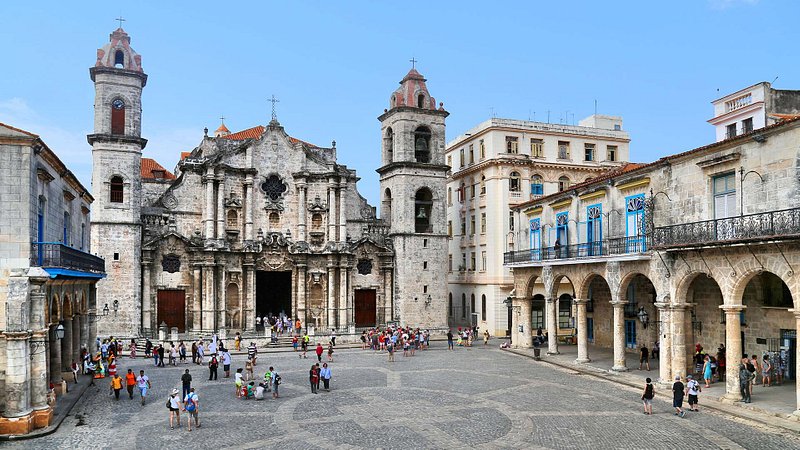
American tourism on Cuba has been limited for decades, but in 2016, former President Barack Obama propped the door open, allowing everyday Americans to plan "people-to-people" trips—trips to visit with Cubans and learn about Cuban culture—on their own. (Previously, travelers could only visit with approved tour operators.) After decades of pause, cruises and commercial flights also resumed service to Cuba in 2016.
The following year, former President Donald Trump reversed that policy , eliminating the people-to-people option and organized group travel; banning cruises; and prohibiting U.S. airlines from flying into any other Cuban city besides Havana. Trump did, however, leave the door open for travel under the broad banner of "Support for the Cuban People," which, per The Washington Post , "required more direct aid to locals on the ground."
In 2022, President Joe Biden announced plans to resume people-to-people group travel in Cuba in a new capacity, though concrete details have yet to be released. (Individual travel is still restricted.) Biden also greenlit commercial flights to Cuban cities other than Havana to resume (though cruises are still banned).
What about now? Can Americans actually go to Cuba?

Yes. But not in typical tourist fashion, meaning you can’t fly to a beach resort and flop down the way you can in other Caribbean countries. But per the Code of Federal Regulations (CFR), Americans are allowed to travel to Cuba for a dozen state-sanctioned purposes, including family visits, journalistic activity, educational or religious activities, humanitarian projects, and Support for the Cuban People. It’s precisely that last banner under which many Americans travel to Cuba, and those types of trips must have a full-time schedule of activities sponsored by human-rights organizations or other organizations that promote democracy and/or civil society in some way. The activities must "[e]nhance contact with the Cuban people, support civil society in Cuba, or promote the Cuban people's independence from Cuban authorities," per the CFR . Again: no lazy days on the beach.
Rules put in place by the U.S. government prohibit Americans from interacting with businesses owned by or affiliated with the Cuban government; to do so would be a violation of a decades-old trade embargo. That makes many hotels—which, in Cuba, are largely government-owned or government-affiliated—off limits (you can find the list of banned hotels on OFAC's restricted entities list ).
Instead, Americans are required to stay in casa particulares , civilian-owned, guesthouse-like private residences, dine at privately owned restaurants ( paladares ), and shop at privately owned stores owned by non-state-affiliated proprietors ( cuentapropistas ).
Which visa or documents do I need to travel to Cuba?
Cuba requires that all visitors have a visa before arrival. If you're visiting under the "Support for the Cuban People" category, you will need a tourist visa—also known as a tourist card—which grants up to a 30-day stay. (The visa options are listed out on the Embassy of Cuba website .)
The most common way to acquire a tourist visa is through your airline; you can purchase visas (usually between $50 and $85) at the airport before the flight. Because policies vary, be sure to confirm the details before your trip. You can also purchase Cuban tourist visas online through third-party companies or in-person at some Cuban consulates (call ahead to find out whether the nearest consulate offers them). Keep in mind: You will need to prove, typically in the form of a return plane ticket, that you’re planning on exiting Cuba before the visa expires.
Cuba also requires travelers to purchase non-U.S. health insurance, which is typically provided by your airline and included in the airfare. Otherwise, you can purchase it at the airport upon arrival in Cuba. Because of the pandemic, you must also fill out a health declaration form .
All of these rules can change quickly—and sometimes without warning—so it’s important to confirm policy specifics with the Embassy of Cuba before your trip.
On the U.S. side of the equation, there is no paperwork and you don't need to apply for a special license if you plan to travel to Cuba under one of the 12 approved categories. But you must carry an itinerary with you at all times that proves the purpose of your visit. You must also retain documentation of every transaction you make in Cuba for five years after your visit, which you may have to provide to OFAC if requested. Because these rules can change at any point, confirm them with the U.S. Department of State and OFAC before your trip.
Which US airlines fly to Cuba?

In June 2022, Biden opened air travel to other Cuban cities besides Havana , including the beach-resort town of Varadero and historic city of Santiago de Cuba. Today, American Airlines, Delta Air Lines, JetBlue Airways, Southwest Airlines, and United Airlines all run flights to Cuba from the U.S. Gateway cities with nonstop flights include several Florida cities, including Miami, as well as Houston and New York City.
What about currency and connectivity in Cuba?
- There is Internet in Cuba, but it's widely known to be limited and slow. You will likely have to pay by the minute, and prices vary.
- Many U.S.–based cell phone providers offer roaming coverage in Cuba, but check with your specific provider.
- Credit and debit cards issued by American banks are not widely accepted in Cuba, and many businesses may not have an infrastructure to support international transactions, so you should bring cash and exchange it upon arrival at the airport, a bank, or a casa de cambio (CADECA) exchange house.
- The only currency in Cuba is the Cuban peso (CUP). The Cuban convertible peso (CUC) ended circulation in 2021. That said, many businesses accept euros.
What else about Cuba should travelers be aware of?
In July 2021, during an extreme economic crisis, Cubans staged public demonstrations, protesting their lack of access to essentials like food, medicine, and electricity, as well Covid-19 restrictions. The government retaliated by detaining hundreds of protestors, some 700 of which were still imprisoned a year later . Protests continue to flare up, even as recently as this fall .
According to Human Rights Watch , "The Cuban government continues to repress and punish virtually all forms of dissent and public criticism. At the same time, Cubans continue to endure a dire economic crisis, which impacts their social and economic rights."
Given these circumstances, Cuba is facing the largest migration crisis in the country's history. In 2022, some 250,000 Cubans —a full 2 percent of the country's total population—left the country for the U.S., marking the largest exodus since the 1959 Cuban Revolution. As of this month, the United States has restarted visa services at the U.S. Embassy in Cuba and plans to issue 20,000 visas to Cubans a year. Follow updates from the Department of State to be aware of the latest travel advisories .
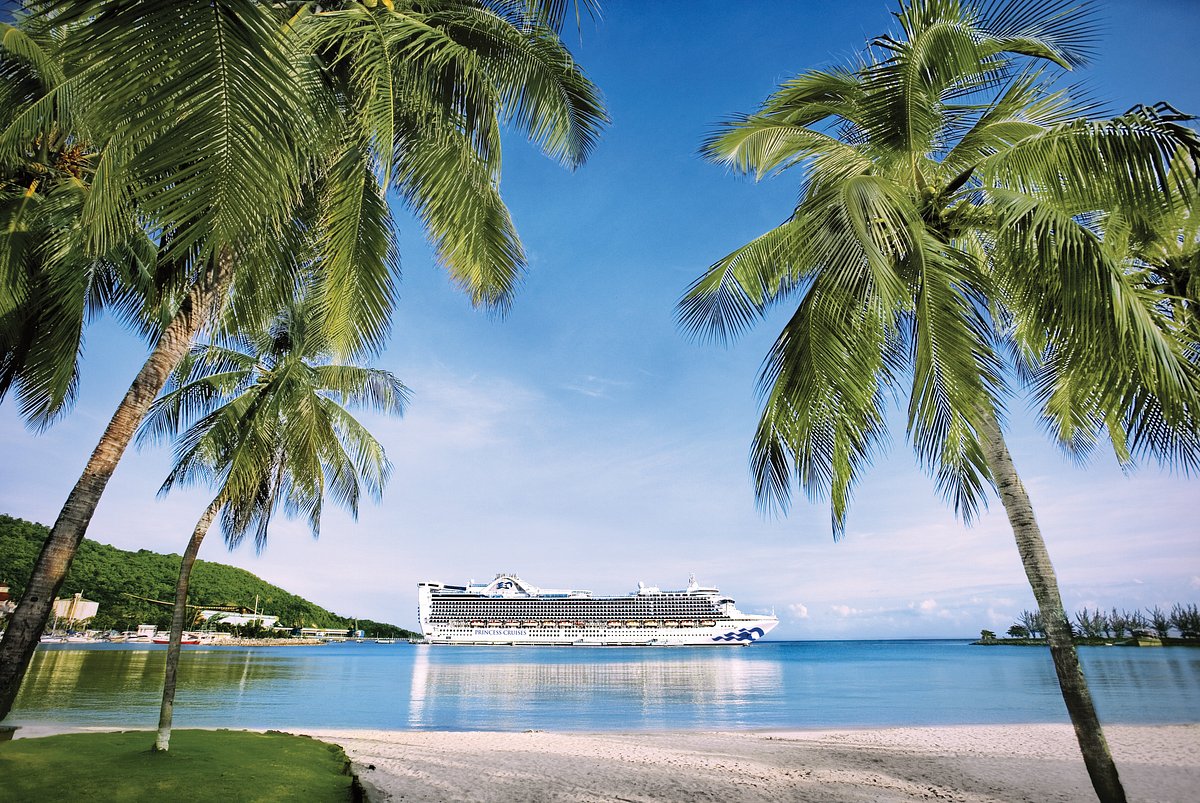
I went to Cuba after it reopened - here’s what you need to know

Oct 27, 2020 • 8 min read
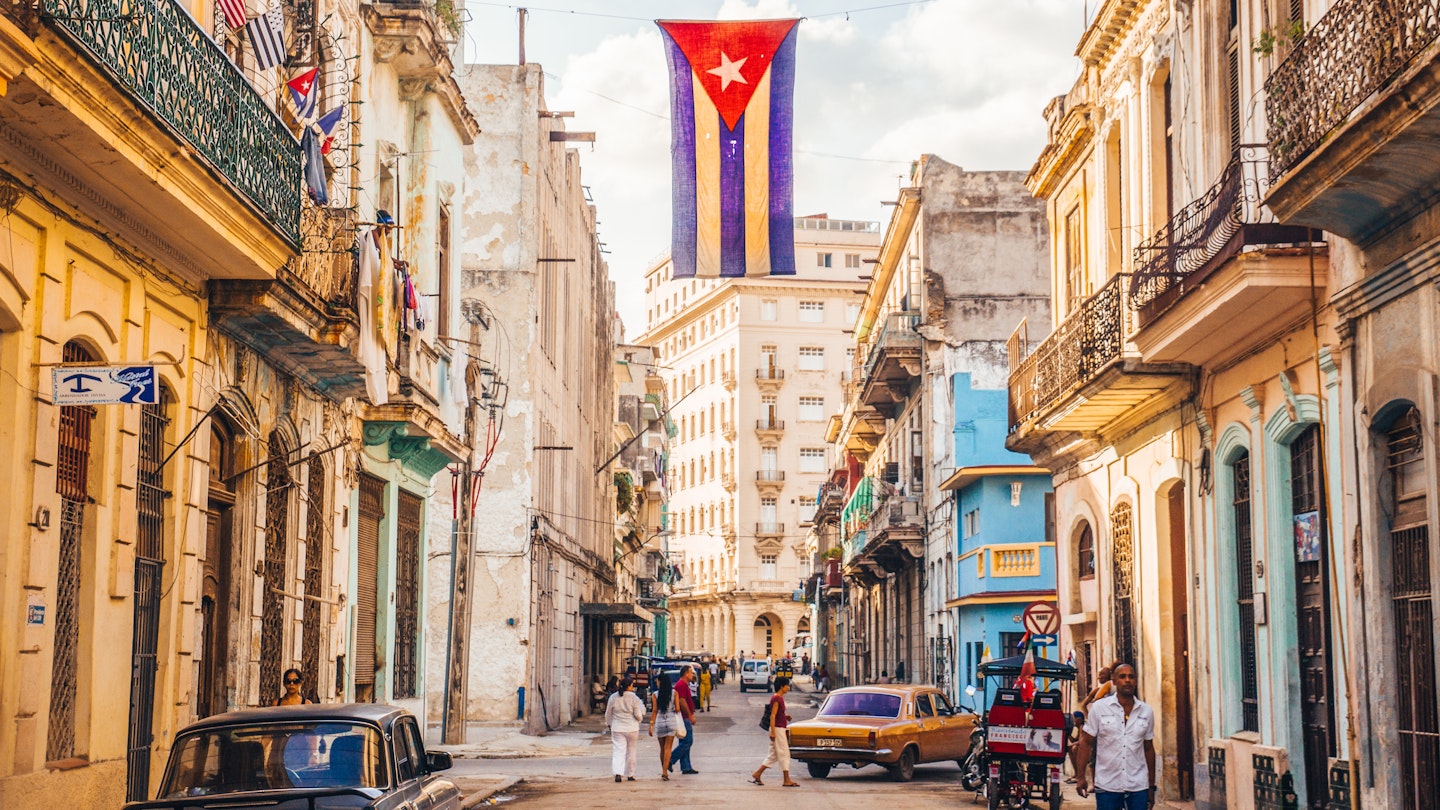
Cuba has reopened to tourists. Here's what it's like to visit © Julian Peters Photography / Shutterstock
Cuba and I go back a long way. As a Lonely Planet writer and occasional tourist, I’ve been traveling to the country for nearly 25 years, from the economic crises of the 1990s to the heady days of 2016 when President Obama and The Rolling Stones dropped by in the same month. I secretly dreamed it would be the first place I revisited when coronavirus restrictions were lifted.
The opportunity cropped up sooner than I expected. In early July, Cuba tentatively announced it was ready to reopen several of its offshore islands to tourism. Even better, to lure back nervous travelers and help boost the country’s beleaguered economy, all international visitors were to be given a free COVID-19 test on arrival.
By September, the first airplanes began flying from Canada to Cayo Coco , a large tropical key off the north coast, home to 30 all-inclusive resorts but no permanent Cuban population. Cayo Coco was to be a pilot scheme, the first stage of Cuba’s phased reopening. By screening everyone who entered, including hotel workers bused in via a causeway from the Cuban mainland, the government would create a unique COVID-free vacation zone.
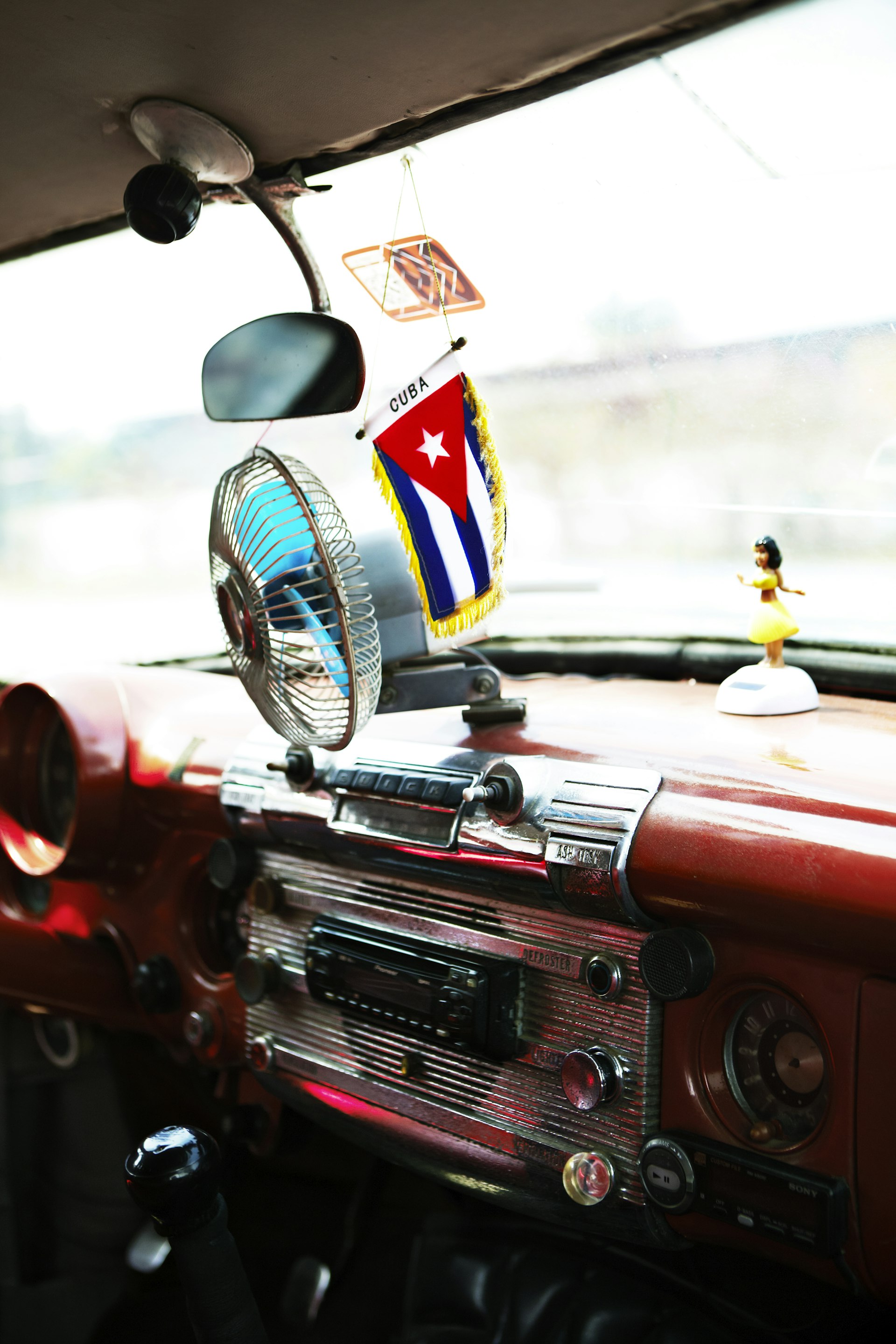
Booking my trip
After scouring the internet for deals and flight information, I made a booking with Air Canada, the first Cuba-bound airline to reactivate flights in September. My package included return flights from Vancouver , a mandatory hotel reservation and special COVID-19 medical insurance. All in, my trip cost CAN$912 (US$693 at current exchange) – that's hotel (including food and drink), bus transfers, return flights from Vancouver and insurance. But rates may start going up in November.
For this trip, at least, I would be confined to an all-inclusive resort strip off Cuba’s north coast with no access to the mainland. Nevertheless, the journey still had some inherent risks. A positive COVID-19 test at the airport would leave me facing up to two weeks in a Cuban hospital. Similarly, when the fun was over, I would have to endure 14 days of quarantine back home.
Weighing up the pros and cons, curiosity prevailed over indecision. In the unpredictable world of travel writing, journeying into the unknown is part of the job description. I loaded up on hand sanitizer, obtained a good mask for the plane and got ready to head south.
Cuba and the pandemic
In the global battle to mitigate coronavirus, Cuba has emerged as the New Zealand of the Americas: the country currently has the lowest death rate (per million inhabitants) in Latin America. In a nominally socialist country, state control and central planning has helped stem the flow.
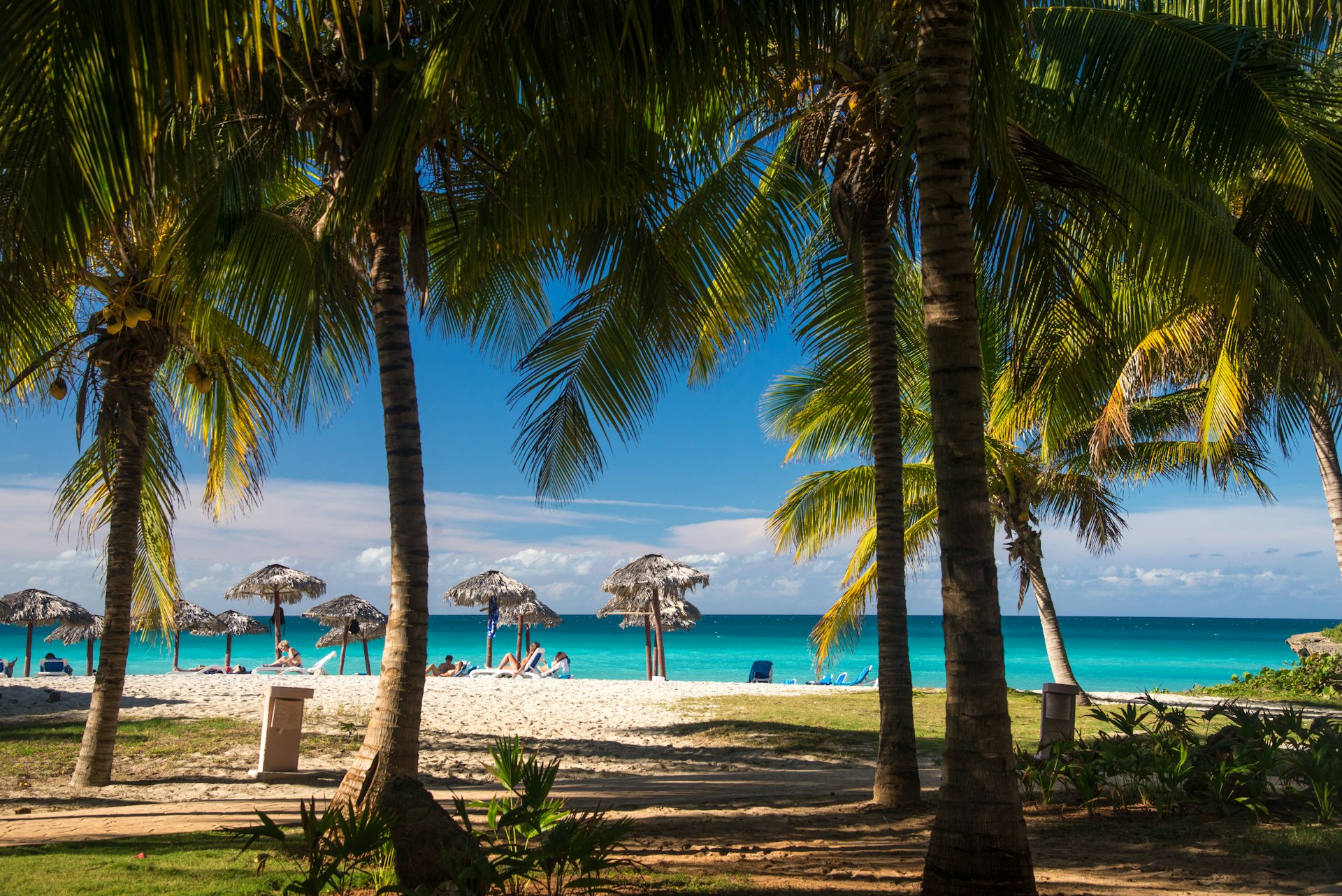
"Cuba has overcome the pandemic thanks to a 'prevention and control' plan, prepared in January 2020," Roy Perez in Santiago de Cuba explained to me when I contacted him by email for some pre-trip advice. "The plan included training medical staff, preparing quarantine facilities, implementing special contact-tracing processes, and informing the public (including tourism workers) about symptoms and precautions.
"Medical students went door to door to screen thousands of people daily. Masks remain mandatory, and the fines for being caught without one are pretty stiff."
Roy is the co-owner of Roy’s Terrace Inn , a private homestay and restaurant in Cuba’s second city. Prior to my trip, I asked him and another friend, Luis Miguel in Havana how Cubans felt about tourists returning when the country fully reopens, possibly as early as December.
"Economically speaking, Cubans are more than ready for visitors to return." Roy said, "While there’s an underlying fear that reopening could lead to further COVID-19 outbreaks, I think 90% of Cubans are willing to take the risk."
Luis Miguel, who runs Casa 1932 , an art deco-themed homestay in Centro Havana, agreed. "I have kept my business closed in line with the country’s COVID-19 protocols, but after carrying out some renovations over the summer, I am ready to start offering my services again, this time with higher quality and new standards of hygiene."
Roy also hopes to reopen soon: "Now that the COVID-19 measures have been eased, we certainly will open the business again. In fact, we already have some bookings for November, December and January from Canadian, Italian and German guests. We are super happy to say we’ve had zero COVID-19 cases in Santiago for over two months."
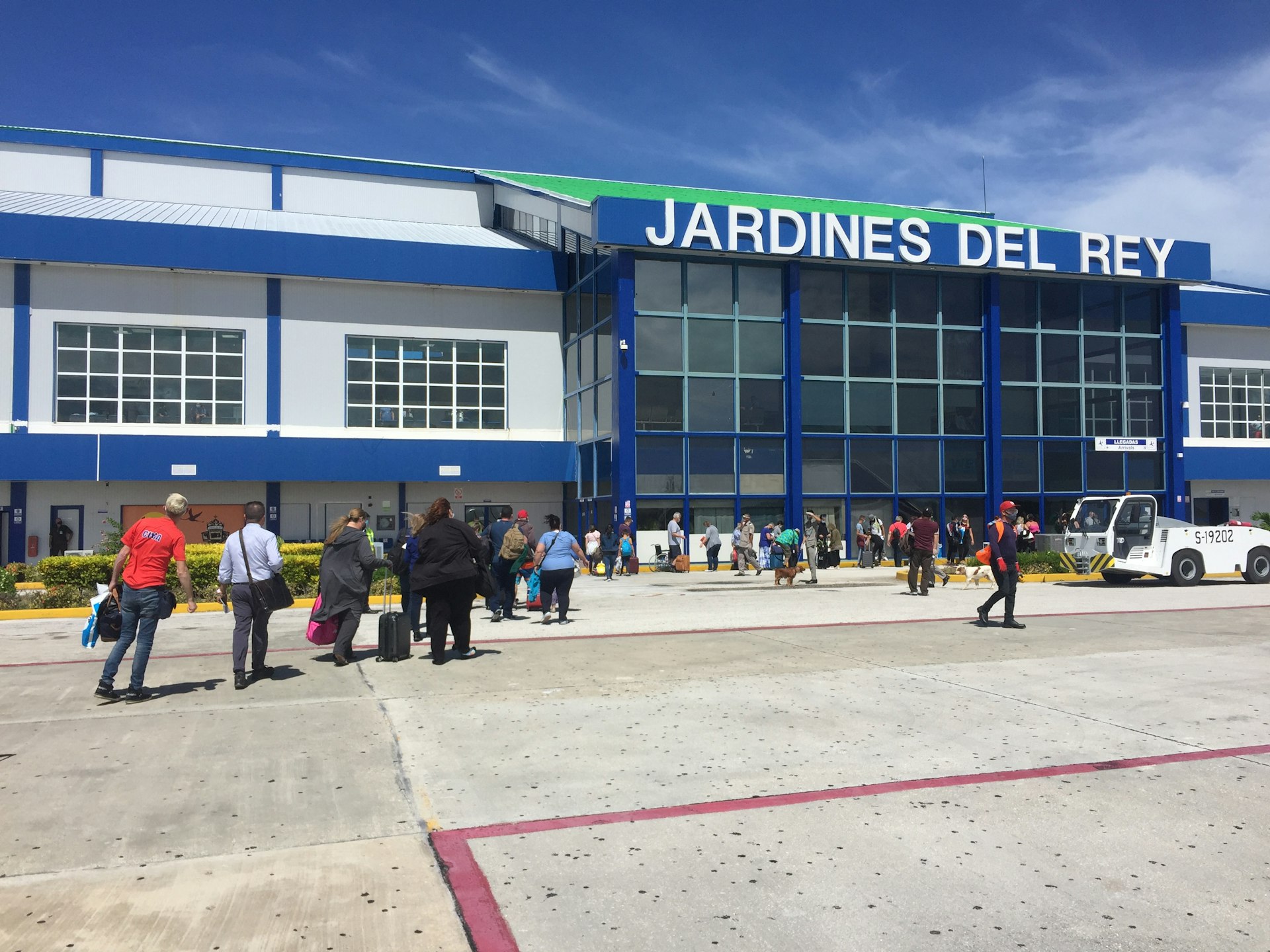
Arriving in Cuba
Braced for my own trip, I arrived at a deserted Vancouver airport on a Friday night in mid-October for the red-eye to Toronto, my first flight since the beginning of the pandemic. Though relieved to see the plane’s middle seats had been left empty, I still felt paranoid enough to pull on two face masks and hold my bladder for an agonizing four-and-a-half hours until we landed (thoughts of a Cuban hospital stay had me spooked).
By bizarre contrast, the connecting flight in Toronto was jammed full. Sitting elbow-to-elbow with 200 COVID-weary Canadians, I metaphorically held my breath for three hours as we coasted over the US and the Straits of Florida arriving five minutes early at Cayo Coco’s Jardines del Rey airport to a relieved round of applause.
The disembarkation was quick and smooth. First, our baggage was sanitized on the runway; then we were filtered through an air-conditioned lounge for a blink-and-you’ll-miss-it COVID-19 test (two swabs up the nose, one in the throat). Next, it was through customs, security, baggage collection and a final temperature test before we exited the airport. The whole airplane was processed in less than an hour. It was an impressive start.
The Cubans were extremely happy to see us. The pandemic combined with a recently tightened US embargo has hit the already weakened economy particularly hard. Tourism accounts for over 10% of Cuba’s GDP and Canadians make up nearly one-third of all tourists. We were enthusiastically welcomed with smiles, music, dance, and rum cocktails.
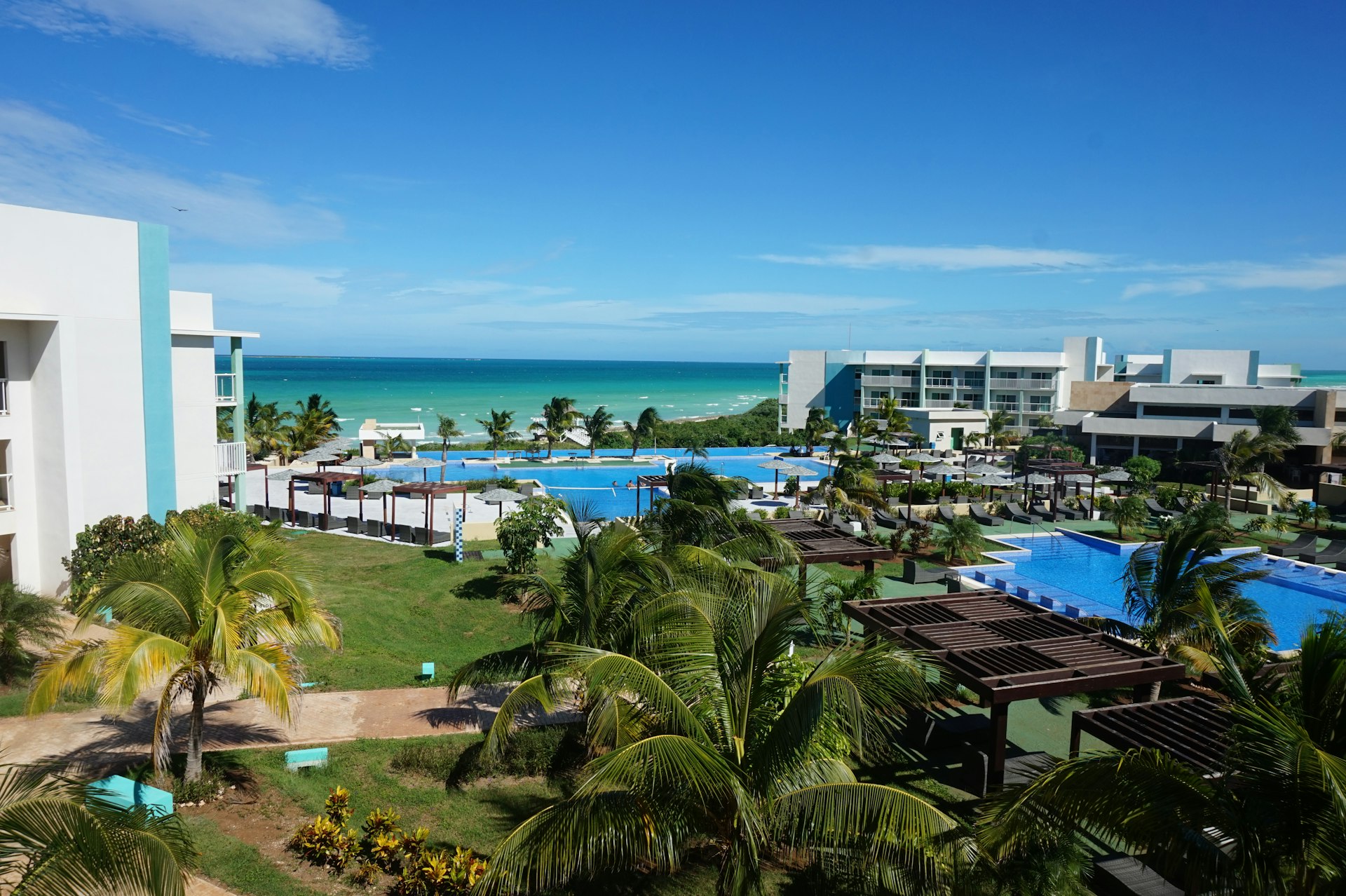
A surreally empty hotel
I was staying at Hotel Gran Muthu , a 500-room resort on Cayo Guillermo, Cayo Coco’s beach-rimmed smaller sibling, where there were only 26 other guests. What would normally resemble a noisy holiday camp, became a tranquil monastic retreat in a pleasant tropical island setting with better food and more gregarious service (staff outnumbered guests by about three to one).
For the first day masks remained mandatory, but after the arrival of our COVID-19 test results the following morning (everyone tested negative), they were peeled off with barely suppressed glee. I had almost forgotten what it felt like to stand next to a stranger and have a face-to-face conversation.
For the next seven days I reveled in my idyllic tropical cocoon, roaming deserted beaches, looking for flamingos in briny mangrove swamps, troll fishing for barracuda and reading Hemingway. It felt about as safe as you could get in a world preoccupied with coronavirus.
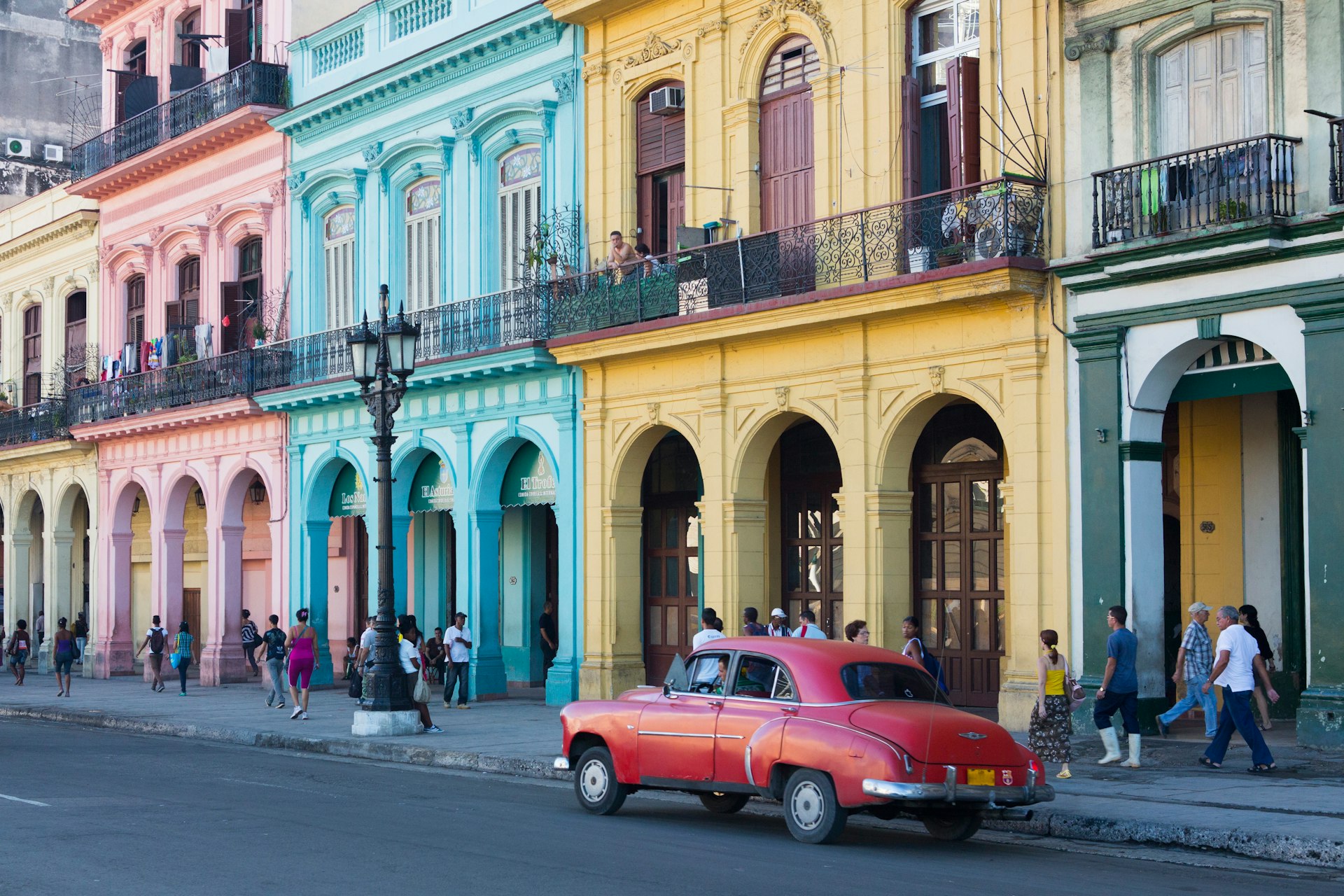
Is it safe to visit Cuba?
So far, Cuba has performed surprisingly well in both managing the pandemic and reopening for tourism in a way that is safe and effective. Six hotels were operating when I visited, but other tourist zones in Cayo Santa María and Varadero are due to open in early November.
All hotels are well staffed with a resident nurse, doctor, and epidemiologist, and fully stocked with abundant sanitizers and cleaning materials. Staff generally work two-week shifts followed by two weeks at home. They are tested before every new shift and always wear face masks when dealing with tourists.
While no system is fool-proof and COVID-19 has a nasty way of eking its way into anywhere and everywhere, Cuba’s reopening has proved to be unique and relatively low-risk. Two months in, only one person (a Cuban-American) has tested positive for coronavirus. If you’re longing for a quiet getaway and can handle the 14-day quarantine when you get home, keep an eye out as new travel bridges open and more airlines resume flights. In Cuba, you’ll be heartily welcomed.
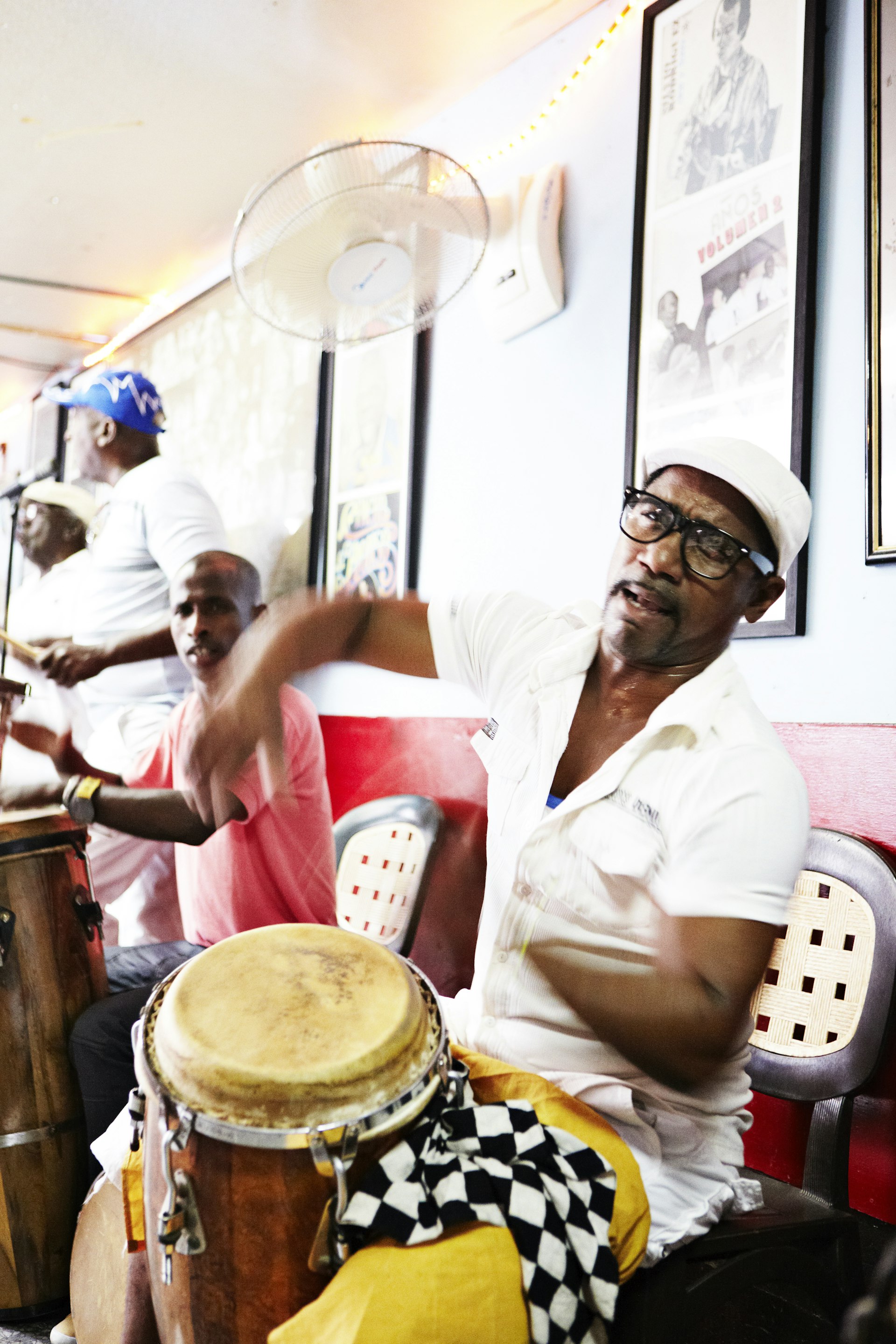
How to visit Cuba
TUI Group resumed twice-weekly flights from the UK to Cuba starting in the late October. Flights run from Manchester and London Gatwick to Varadero. Travelers must book full hotel packages and aren't allowed to leave the resort zone. Covid insurance is included in the package and all visitors get a free Covid test at Varadero airport. UK citizens aren't required to quarantine when they return home. German charter Condor will also resume flights to Varadero in early November from Frankfurt & Dusseldorf.
From Canada, Air Canada Vacations flies once a week from both Toronto and Montreal into Jardines del Rey Airport. Varadero flights will be added in November and Cayo Santa Maria in December. Westjet , Sunwing and Air Transat will resume flights from Canada to Cuba in early December.
Currently, there are no flights from Cuba to the US.
For the time-being, only three main tourist enclaves are open for business: Cayo Coco, Cayo Santa Maria and Varadero.
You can't currently fly into Havana and the city remains closed to international visitors. As yet, there is no concrete date for when the city will reopen (word on the street suggests before Christmas).
You might also like:
Here are the new rules for visiting the Caribbean Why female Cuban professionals are leaving their careers to become artists Which Caribbean island is best for you
Get more travel inspiration, tips and exclusive offers sent straight to your inbox with our weekly newsletter .
Explore related stories
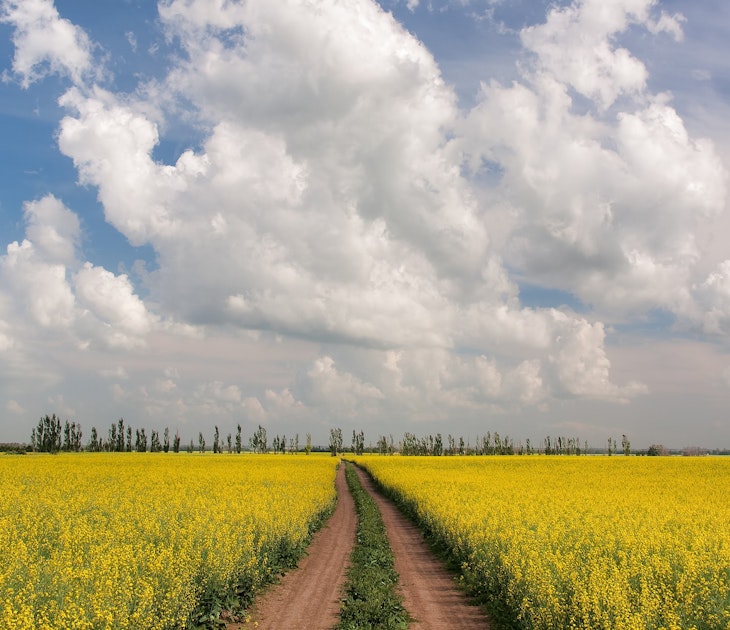
Destination Practicalities
Apr 26, 2024 • 6 min read
Plan your visit to Saskatoon, the largest city in the Canadian province of Saskatchewan, with our first-timer's guide.

Apr 23, 2024 • 6 min read

Apr 23, 2024 • 7 min read

Apr 17, 2024 • 5 min read

Apr 15, 2024 • 12 min read

Apr 13, 2024 • 8 min read

Apr 12, 2024 • 7 min read

Apr 11, 2024 • 6 min read
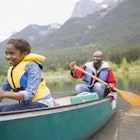
Apr 11, 2024 • 10 min read

Apr 2, 2024 • 8 min read
Stay up to date with notifications from The Independent
Notifications can be managed in browser preferences.
UK Edition Change
- UK Politics
- News Videos
- Paris 2024 Olympics
- Rugby Union
- Sport Videos
- John Rentoul
- Mary Dejevsky
- Andrew Grice
- Sean O’Grady
- Photography
- Theatre & Dance
- Culture Videos
- Food & Drink
- Health & Families
- Royal Family
- Electric Vehicles
- Car Insurance deals
- Lifestyle Videos
- UK Hotel Reviews
- News & Advice
- Simon Calder
- Australia & New Zealand
- South America
- C. America & Caribbean
- Middle East
- Politics Explained
- News Analysis
- Today’s Edition
- Home & Garden
- Broadband deals
- Fashion & Beauty
- Travel & Outdoors
- Sports & Fitness
- Sustainable Living
- Climate Videos
- Solar Panels
- Behind The Headlines
- On The Ground
- Decomplicated
- You Ask The Questions
- Binge Watch
- Travel Smart
- Watch on your TV
- Crosswords & Puzzles
- Most Commented
- Newsletters
- Ask Me Anything
- Virtual Events
- Betting Sites
- Online Casinos
- Wine Offers
Thank you for registering
Please refresh the page or navigate to another page on the site to be automatically logged in Please refresh your browser to be logged in
Cuba travel guide: Everything you need to know before you go
Many picture the faded pastel streets of vintage-feel havana, but beyond the capital there’s a wild side to cuba, plus more elegant old cities and dreamy beaches, article bookmarked.
Find your bookmarks in your Independent Premium section, under my profile
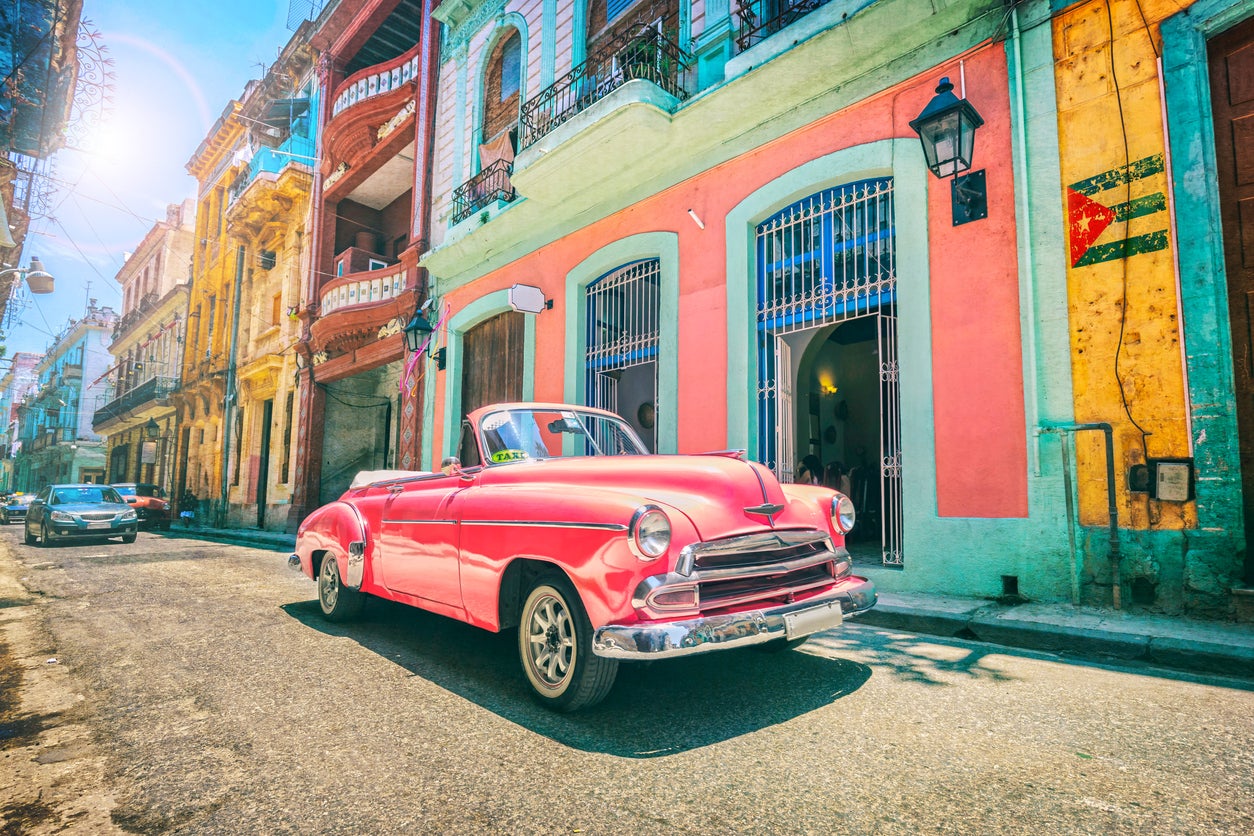
Sign up to Simon Calder’s free travel email for expert advice and money-saving discounts
Get simon calder’s travel email, thanks for signing up to the simon calder’s travel email.
Dazzling sugar-soft beaches, twinkling turquoise seas, palm-tree studded mountain trails, muscular castles, and pretty cities brimming with handsome villas, live bands, salsa dancing, and art. Oh, and those vintage, colourful American cars… Cuba is an enigma, clinging to socialism while finding its feet in a post-pandemic world. Come for vibrant Havana and its nightlife but take off into the wilds of this crocodile-shaped isle for adventure, wild beaches, cultural quirks, cigars, diving, festivals and foodie spots, and the best thing of all – the warm and witty Cubans.
Current travel restrictions and entry requirements
There are no Covid restrictions on entry or on the ground. Travellers must obtain a visa-like tourist card and fill out the online Viajeros form before travelling.
Best time to go
Cuba is a great destination year round, but is insufferably hot in July and August (though the city of Santiago de Cuba hosts two riotous, musical festivals in July that are worth catching). November to April is high season, when the weather is glorious, and prices are higher. Dozens of festivals and events are held in this period: music, dance, ballet, jazz, film, and art. Hurricane season runs from June until November.
Top regions and cities
The Spanish conquerors of Cuba grew rich on the back of the sugar and tobacco trade and poured their wealth into one of the finest cities in the Americas. As a result, Havana is gorgeous: richly worked with colonial villas, decorated churches, flower-filled patios, Art Deco towers, and 50s mansions. Find its heart in the streets of the Old City, now vibrant with indie shops, bars, and cafés. Stroll the ocean promenade, the Malecón, and hail a chrome-festooned vintage motor to tour the castles on the bay and the leafy streets of villas and galleries of the Vedado neighbourhood. By night, seek out rooftop bars, art gallery openings, and boho nightlife spots across the city.
- Read our Havana city guide
Viñales Valley
It’s impossible not to be seduced by this lush valley of mini mountains, royal palms, tobacco farms, horse-riding farmers, and cutesy B&Bs in rural Cuba. At dawn a mist encircles the columns and porches of homes in Viñales town. Breakfast on eggs and mango as the sun burns through, then venture out on a horse, or by foot, to explore this Jurassic region of Cuba where towering limestone humps, known as mogotes , dot the valley floor, a result of millions of years of erosion. At sundown sit on the porch of your B&B sipping a freshly made mojito. You’ll find delicious farm-to-fork food in Viñales, too.
On the southern coast of Cuba, the tiny, cobbled streets of Trinidad spill down the foothills of the Escambray Mountains towards the beautiful blue Caribbean Sea. Trinidad is a photographer’s and salsa dancer’s dream. Huge mansions, all cinnamon, avocado and ochre-hued and fitted with European marble and chandeliers, were built by sugar barons who reaped enormous wealth from the slaves who worked their record-busting sugar plantations. Today these ornate buildings are galleries, museums, restaurants, and private homes. Find some of the most ridiculously pretty B&Bs in the country here. Dance the night away to live music and recover on the nearby Caribbean beach the following day.
Santa Clara
Che Guevara, the Argentine doctor turned Cuban guerrilla, is buried in an elaborate mausoleum sculpture complex on Santa Clara’s Revolution Plaza. Alongside his mortal remains are those that died with him in a failed guerrilla campaign in Bolivia in 1967. Visit the neighbouring Che museum, too, before heading off to the Café-Museo Revolución where, alongside a strong cup of Cuban coffee you can soak up the café owner’s incredible Che memorabilia collection. Nightlife pivots around the theatre and bars of the main square but don’t miss the wonderful El Mejunje alfresco club famous for live music, cabaret, and LGBT nights.
Santiago de Cuba
With winding historic streets that climb from the enormous harbour up to the city centre, you’ll get a sense of the setting of the island’s second city. It’s surrounded by monumental mountains, one of them named after a famous cocktail. And it was in this fabled place, that Señor Bacardí discovered the secrets of ageing rum 160 years ago and launched the world’s most famous rum. Explore the homes, museums, and music spots of this lively city – more Caribbean in feel than distant Havana and soak up the live African and Spanish rooted music in town centre venues, daiquiris and mojitos in hand! Fidel Castro’s tomb is found at the city’s impressive marble cemetery.
Best under-the-radar destinations
Baracoa is Cuba’s best-kept secret. Six hundred miles from Havana, it’s a trek to get there, but oh so worth it. You’ll climb mountains, bathe in crystal-clear rivers, swing in hammocks, visit cacao farms, search for aboriginal hideouts, and taste some of the best food in Cuba – fish bathed in coconut, and a mashed coconut, honey, and nut dessert wrapped in a palm cone. Dance it all off in the little bars and Casa de la Trova (a local meeting house or dance hall) fringing the tiny main square.
Down on the south coast of Cuba – with one road in and one road out – is the Bay of Pigs, infamous for the US attempted invasion of the island in 1961. But it’s not just a site for history buffs: the water is the most beautiful in Cuba, aquamarine flecked with inky indigo blue, home to colourful fish, and the odd war wreck. Snorkel, dive, and bike to secret beaches along the jagged limestone coast here, backed by swamp peppered with Cuban crocs and colourful endemic birdlife.
Remote Gibara is a fishing port of white houses and jumbled rooves crammed around a small harbour in northeast Cuba. It bursts into life for the annual international cinema festival in August which attracts Cuban and international stars. Come for the caves that can be explored with guides, the tasty regional fare rooted in fish and shellfish, and a highlight – the chance to dive in a series of beautiful sinkholes scattered in pristine jungle settings around town.
Best things to do
Stay in a cuban b&b.
Few places in the world offer fancy digs for very fair prices. In Cuba you can bed down in villas, mansions, fincas (farmhouse stays) and Art Nouveau apartments for unthinkable prices. But, more than that, the Cuban families who host international guests will be the stars of your stay. The photos of fabulous interiors will get a zillion likes on the ‘gram, but the memories of your warm, loquacious hosts with 101 gripping stories to tell will linger longer.
Lonely mountain roads with epic scenery, isolated Spanish colonial towns and rural villages, virgin white sand beaches with not another soul in sight, and quirky attractions found away from tourist hotspots. All this is possible in a hire car, and more. You’ll need to reserve, and fuel costs are rising, but there’s no better way to explore off the beaten track especially as the public coach network is limited. Bring your own snorkel, and lunch!
Take a guided art tour
One of the extraordinary hallmarks of Cuba’s 1959 revolution was a huge investment in the arts. You’ll find world-class art in Cuba, Havana especially, and a guided tour to the homes and studios of some of the best artists at work on the island is a fascinating introduction to the fertile arts’ scene, and life in Cuba in general. Works from Cuba’s living artists are found in New York’s Metropolitan Museum of Art and MoMa, and London’s Tate. Choose your medium, or let the guide choose for you.
Getting around
Hiring a car isn’t cheap. Use the public coach company Víazul ( bookable online inside and outside the country) which runs regular buses from Viñales in the west to Baracoa in the east, with routes out to popular beach resorts and cities. New air-conditioned train carriages launched in 2019 but the network is antiquated. Train tickets can be bought at any Viajeros agency office on the island (cash purchase). Licensed and unlicensed taxis can be used to get to remote spots.
How to get there
TUI is the only airline flying direct from the UK to Cuba (Varadero beach resort) from Manchester. From London you can fly with Air France, Iberia, and Air Europa via other European cities, or with a couple of budget airlines including Spain’s World2Fly and Iberojet.
Money saving tip
Wifi is available at public wifi hotspots and accessible by scratch cards bought from telephone (Etecsa) offices or by resellers on the street. Buy a Cuban SIM card (which can be bought online before you fly) and pick it up at Havana’s international airport. A 30-day Turista SIM card costs US$25 and includes 6GB of data, 100 texts and 100 minutes of calls. Top-ups can be bought online .
What’s the weather like?
The weather is comfortably hot and breezy from November through to April. Daily tropical rains begin in May and run to October, but even these downpours evaporate in seconds. As mentioned above, July-August can get too stiflingly hot for many.
What time zone is it in?
Cuba is five hours behind GMT.
What currency do I need?
Cuba united its dual currencies in January 2021; the Cuban Peso (CUP) is now the sole official currency, but the monetary situation in Cuba is currently complicated - with locals using MLC (a currency which Cuban must upload to their bank cards by buying foreign currencies) for some purchases. This is an excellent overview.
For a holiday, bring plenty of Euros in cash (more than you think you’ll need) to pay for accommodation on the go, restaurant meals, and private transport and services. Bring a debit or credit card (with no connections to the United States; call your bank to check) to buy essentials such as bottled water, medicines, hygiene products and some food at “MLC” (Moneda Libremente Convertible) stores, where cash is not accepted. Bank cards are used to pay for car hire; the island’s only coach service, Víazul; activities such as diving, sailing trips and canopy walking; and accommodation and meals at government-owned hotels and restaurants, as well as to withdraw cash in Cuban Pesos (CUP). The CUP is used to buy street food, restaurant meals, museum entrances, local transport, and train transport. Change a small amount of Euros into CUP on arrival. Black market rates for your Euros will make your holiday much cheaper.
What language is spoken?
Spanish is the official language.
Anything else I should know?
Cuba is a communist, one-party state. Do read up on the politics and economics before you visit. Bring all medications you may need with you.
Join our commenting forum
Join thought-provoking conversations, follow other Independent readers and see their replies
Subscribe to Independent Premium to bookmark this article
Want to bookmark your favourite articles and stories to read or reference later? Start your Independent Premium subscription today.
New to The Independent?
Or if you would prefer:
Want an ad-free experience?
Hi {{indy.fullName}}
- My Independent Premium
- Account details
- Help centre
- Travel advice
Cuba travel advice
Explore our complete guide to Cuba with the latest travel advice for travellers and holidaymakers including official updates and local travel tips for Cuba.
- Essential travel guide
- Weather & climate
- Travel health
- Covid live updates
- Travel features
- Top travel deals
- Destinations
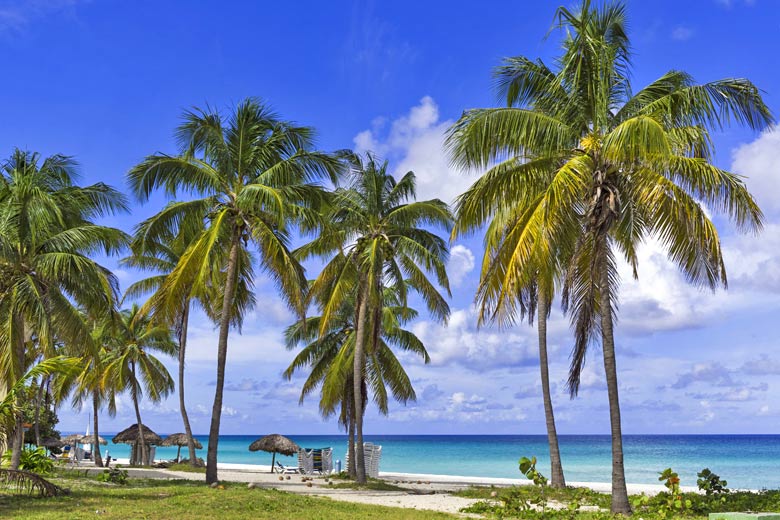
Cuba travel guide - essential info
Below is a beginner's guide to Cuba with essential travel facts such as dominant language spoken, typical flight time from the UK and the local currency. You can also check whether visas are required and what plug adapter you need to pack.
Why visit Cuba?
Considering a holiday to the Cuba? Here are some of the very good reasons it makes such a wonderful holiday destination be it for beaches or culture to ensure you get the most out of your 2024/2025 escape.
Cuba tourist information
✝ = Typical flight time from the UK and visa requirements for UK travellers.
Recommended for Cuba

Cuba deals >>
Back to top
Cuba weather
The Cuba weather guide shows long term monthly averages for Havana .
Cuba destinations >>
Marella Cruises: up to 8% off ocean cruises
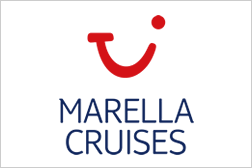
- Book online & save up to 8% on Marella Cruises
- Discount varies by season. Book online with TUI
- Destinations across the Med, Caribbean & USA
View all Marella Cruises offers
Cruise deal finder
Destination Any destination Barbados Croatia France Greece Italy Majorca Portugal Turkey Ibiza Majorca Fuerteventura Gran Canaria La Gomera La Palma Lanzarote Tenerife Caribbean Antigua Aruba Barbados Bonaire British Virgin Islands Cayman Islands Cuba Curacao Dominica Dominican Republic Grenada Guadeloupe Jamaica Martinique Puerto Rico Sint Maarten St Kitts and Nevis St Lucia St Vincent and the Grenadines Trinidad and Tobago Turks and Caicos Islands Virgin Islands Europe Croatia Cyprus France Gibraltar Greece Italy Malta Monaco Montenegro Portugal Slovenia Spain Turkey Corsica South of France Corfu Crete Kefalonia Kos Mykonos Rhodes Santorini Campania Italian Riviera Sardinia Sicily Tuscany Mediterranean Bermuda Mexico Azores Madeira Balearic Islands Canary Islands Costa Almeria Costa Blanca Costa Brava Costa de la Luz Costa del Sol Costa Dorada Antalya Coast Bodrum and Izmir Coast Dalaman and Marmaris Coast
Check the latest travel advice on visiting Cuba from official government sources (in english) from around the world including entry requirements and travel restrictions.
- UK traveller advice for Cuba - UK FCDO
- Irish traveller advice for Cuba - Department of Foreign Affairs, Ireland
- Canadian travel advice for Cuba - Government of Canada
- US travel advisories for Cuba - US Department of State
- Safe travel advisories for Cuba - Ministry of Foreign Affairs, New Zealand
- Smarter traveller advice for Cuba - Department of Foreign Affairs, Australia
Learn more about the current safety and security risks from terrorism, natural disasters and more. Read about the local laws and customs to consider when travelling around Cuba.
Note : UK FCDO - UK Foreign, Commonwealth & Development Office
FCDO travel advice
Destination Any destination France Germany Greece India Italy Portugal Spain Turkey USA Algeria Angola Benin Botswana Burkina Faso Burundi Cameroon Cape Verde Central African Republic Chad Congo-Brazzaville Congo-Kinshasa Djibouti Egypt Equatorial Guinea Eritrea Eswatini Ethiopia Gabon Gambia Ghana Guinea Guinea-Bissau Ivory Coast Kenya Lesotho Liberia Libya Malawi Mali Mauritania Morocco Mozambique Namibia Niger Nigeria Rwanda Sao Tome and Principe Senegal Sierra Leone Somalia South Africa South Sudan St Helena, Ascension and Tristan da Cunha Sudan Tanzania Togo Tunisia Uganda Western Sahara Zambia Zimbabwe Falkland Islands South Georgia and South Sandwich Islands Afghanistan Armenia Azerbaijan Bahrain Bangladesh Bhutan Brunei Cambodia China East Timor Gaza Strip Georgia Hong Kong India Indonesia Iran Iraq Israel Japan Jordan Kazakhstan Kuwait Kyrgyzstan Laos Lebanon Macau Malaysia Maldives Mongolia Myanmar Nepal North Korea Oman Pakistan Philippines Qatar Russia (Central Asia) Russia (Far East) Saudi Arabia Singapore South Korea Sri Lanka Syria Taiwan Tajikistan Thailand Turkmenistan UAE Uzbekistan Vietnam West Bank Yemen Anguilla Antigua Aruba Bahamas Barbados Bonaire British Virgin Islands Cayman Islands Cuba Curacao Dominica Dominican Republic Grenada Guadeloupe Haiti Jamaica Martinique Montserrat Saba Sint Eustatius Sint Maarten St Barthelemy St Kitts and Nevis St Lucia St Martin St Vincent and the Grenadines Trinidad and Tobago Turks and Caicos Islands Belize Costa Rica El Salvador Guatemala Honduras Nicaragua Panama Albania Andorra Austria Belarus Belgium Bosnia and Herzegovina Bulgaria Croatia Cyprus Czech Republic Denmark Estonia Faroe Islands Finland France Germany Gibraltar Greece Hungary Iceland Ireland Italy Jan Mayen Kosovo Latvia Liechtenstein Lithuania Luxembourg Macedonia Malta Moldova Monaco Montenegro Netherlands Norway Poland Portugal Romania Russia San Marino Serbia Slovakia Slovenia Spain Svalbard Sweden Switzerland Turkey Ukraine British Indian Ocean Territory Comoros Madagascar Mauritius Mayotte Reunion Seychelles Bermuda Canada Greenland Mexico St Pierre and Miquelon USA Australia Federated States of Micronesia Fiji French Polynesia Kiribati Marshall Islands Nauru New Caledonia New Zealand Palau Papua New Guinea Pitcairn Island Samoa Solomon Islands Tonga Tuvalu Vanuatu Wallis and Futuna Argentina Bolivia Brazil Chile Colombia Ecuador French Guiana Guyana Paraguay Peru Suriname Uruguay Venezuela
Cuba travel health
Find out more about staying safe when travelling to Cuba with the latest guidance on required vaccinations and recommended medication to take with you.
- Vaccines & medicines for Cuba - CDC
- Health & vaccinations for Cuba - TravelHealthPro, NaTHNac
- How to stay safe & healthy in Cuba - Fit for Travel, Public Health Scotland
Check out the general travel tips for staying safe and healthy in Cuba, risks of preventable diseases and what to pack.
Note : CDC - Centers for Disease Control and Prevention
Cuba covid live updates
Check the latest live updates on Covid-19 in Cuba with the vaccination requirements, current available statistics and up-to-date travel advice from government agencies.
- Travellers' health for Cuba - Ministry of Public Health, Cuba
- Coronavirus timeline in Cuba - Our World in Data
Cuba travel features
Do you want to learn more about Cuba? Read our latest features covering travel tips and insider destination guides on where to go and what to do in Cuba.
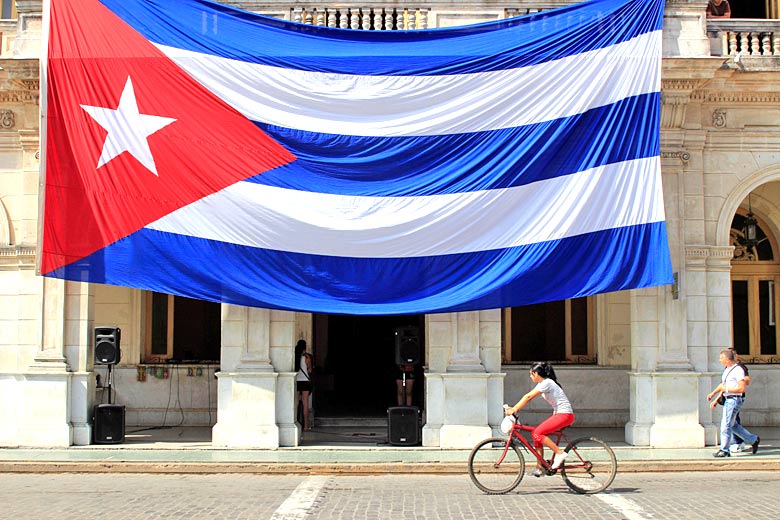
Read our frequently asked questions about travelling to Cuba including the current entry restrictions, covid rules, driving side, electrical plugs used and much more.
Are there entry restrictions to Cuba due to Covid-19?
Cuba is open for tourism from the UK. There are no special entry requirements for Cuba. Check out Ministry of Public Health, Cuba for more information.
Do I need to quarantine in the UK if I travel from Cuba?
You do not need to quarantine on arrival in the UK from Cuba. The UK no longer requires a passenger locator form, Covid-19 test or proof of vaccination.
What is the flight time to Cuba from the UK?
The flight time to Cuba from the UK is typically 10 hours .
Flights to Cuba

What is the time difference between Cuba and the UK?
The time difference between Cuba and the UK is UK time-5 hours .
What is the main language spoken in Cuba?
The main language spoken in Cuba is Spanish . Learn a language for Cuba with Rosetta Stone * , Babbel * and Mondly * .
What is the currency in Cuba?
The currency in Cuba is the Cuban Peso ( CUP ).
Which plugs are used in Cuba?
Cuba uses electrical plug type A + B + C + L (110 Volts) .
Which side of the road do they drive on in Cuba?
They drive on the right side of the road in Cuba. Find out more about driving in Cuba with International Drivers Association * .
Transport options for Cuba

Do you need a visa for Cuba?
Yes, UK passport holders do need a visa to enter Cuba. Check Cuba visa requirements for all passport holders with VisaHQ * .
Travel advice by country
Country name All countries - summary Algarve Balearic Islands Barbados Canary Islands Croatia Cyprus Egypt Faroe Islands France Germany Greece Ireland Italy Jamaica Madeira Maldives Malta Portugal Spain Turkey UAE UK USA Algeria Angola Benin Botswana Burkina Faso Burundi Cameroon Cape Verde Central African Republic Chad Congo-Brazzaville Congo-Kinshasa Djibouti Egypt Equatorial Guinea Eritrea Ethiopia Gabon Gambia Ghana Guinea Guinea-Bissau Ivory Coast Kenya Lesotho Liberia Libya Malawi Mali Mauritania Morocco Mozambique Namibia Niger Nigeria Rwanda Sao Tome and Principe Senegal Sierra Leone Somalia South Africa South Sudan Sudan Swaziland Tanzania Togo Tunisia Uganda Western Sahara Zambia Zimbabwe Antarctica French Southern and Antarctic Lands South Georgia and South Sandwich Islands Afghanistan Armenia Azerbaijan Bahrain Bangladesh Bhutan Brunei Cambodia China East Timor Georgia Hong Kong India Indonesia Iran Iraq Israel Japan Jordan Kazakhstan Kuwait Kyrgyzstan Laos Lebanon Macau Malaysia Maldives Mongolia Myanmar Nepal North Korea Oman Pakistan Philippines Qatar Russia (Central Asia) Russia (Far East) Saudi Arabia Singapore South Korea Sri Lanka Syria Taiwan Tajikistan Thailand Turkmenistan UAE Uzbekistan Vietnam Yemen Anguilla Antigua Aruba Bahamas Barbados Bonaire British Virgin Islands Cayman Islands Cuba Curacao Dominica Dominican Republic Grenada Guadeloupe Haiti Jamaica Martinique Montserrat Puerto Rico Saba Sint Eustatius Sint Maarten St Barthelemy St Kitts and Nevis St Lucia St Martin St Vincent and the Grenadines Trinidad and Tobago Turks and Caicos Virgin Islands Belize Costa Rica El Salvador Guatemala Honduras Nicaragua Panama Albania Andorra Austria Belarus Belgium Bosnia and Herzegovina Bulgaria Croatia Cyprus Czech Republic Denmark Estonia Faroe Islands Finland France Germany Gibraltar Greece Guernsey Hungary Iceland Ireland Isle of Man Italy Jan Mayen Jersey Kosovo Latvia Liechtenstein Lithuania Luxembourg Malta Moldova Monaco Montenegro Netherlands North Macedonia Norway Poland Portugal Romania Russia San Marino Serbia Slovakia Slovenia Spain Svalbard Sweden Switzerland Turkey UK Ukraine British Indian Ocean Territory Christmas Island Cocos (Keeling) Islands Comoros Madagascar Mauritius Mayotte Reunion Seychelles Bermuda Canada Greenland Mexico St Pierre and Miquelon USA American Samoa Australia Cook Islands Federated States of Micronesia Fiji French Polynesia Guam Kiribati Marshall Islands Midway Island Nauru New Caledonia New Zealand Niue Norfolk Island Northern Mariana Islands Palau Papua New Guinea Pitcairn Island Samoa Solomon Islands Tokelau Tonga Tuvalu Vanuatu Wake Island Wallis and Futuna Algarve Azores Madeira Argentina Bolivia Brazil Chile Colombia Ecuador Falkland Islands French Guiana Guyana Paraguay Peru Suriname Uruguay Venezuela Balearic Islands Canary Islands England Northern Ireland Scotland Wales Alabama Alaska Arizona Arkansas California Colorado Connecticut D.C. Delaware Florida Georgia Hawaii Idaho Illinois Indiana Iowa Kansas Kentucky Louisiana Maine Maryland Massachusetts Michigan Minnesota Mississippi Missouri Montana Nebraska Nevada New Hampshire New Jersey New Mexico New York North Carolina North Dakota Ohio Oklahoma Oregon Pennsylvania Rhode Island South Carolina South Dakota Tennessee Texas Utah Vermont Virginia Washington West Virginia Wisconsin Wyoming
Be inspired
Get your weekly fix of holiday inspiration from some of the world's best travel writers plus save on your next trip with the latest exclusive offers
We promise not to share your details
Explore holidays in the sun for less
- Beach holidays
- Family holidays
- City breaks
- Summer holidays
- Winter sun holidays
- Holiday offers
- Top travel brands
- Airlines & flights
- Discount hotels
- Airport parking deals
- Jet2holidays
- easyJet holidays
- Love Holidays
- British Airways
More holidays
Airport parking
- Manchester Airport
- Stansted Airport
- Bristol Airport
- Luton Airport
- Birmingham Airport
- Edinburgh Airport
- Gatwick Airport
- Glasgow Airport
- Newcastle Airport
More parking
Airport lounges
- Heathrow Airport
More lounges
- Pinterest (1 share)

Update April 12, 2024
Information for u.s. citizens in the middle east.
- Travel Advisories |
- Contact Us |
- MyTravelGov |
Find U.S. Embassies & Consulates
Travel.state.gov, congressional liaison, special issuance agency, u.s. passports, international travel, intercountry adoption, international parental child abduction, records and authentications, popular links, travel advisories, mytravelgov, stay connected, legal resources, legal information, info for u.s. law enforcement, replace or certify documents.
Before You Go
Learn About Your Destination
While Abroad
Emergencies
Share this page:
Travel Advisory January 5, 2024
Cuba - level 2: exercise increased caution.
Reissued with updates to crime information.
Exercise increased caution in Cuba due to crime .
Country Summary: Petty crime is a threat for tourists in Cuba. Also, violent crime, including armed robbery and homicide, sometimes occurs in Cuba.
Travel outside of the Havana area for U.S. Embassy employees requires a special notification process which may affect the Embassy’s ability to provide emergency assistance to U.S. citizens in Cuba.
Read the country information page for additional information on travel to Cuba.
If you decide to travel to Cuba:
- Be aware of your surroundings.
- Do not physically resist any robbery attempt.
- Do not display signs of wealth, such as wearing expensive watches or jewelry.
- Enroll in the Smart Traveler Enrollment Program (STEP) to receive Alerts and make it easier to locate you in an emergency.
U.S. citizens should always exercise caution when traveling abroad:
- Follow the Department of State on Facebook and Twitter .
- Review the Country Security Report for Cuba.
- Prepare a contingency plan for emergency situations. Review the Traveler’s Checklist .
Embassy Messages
View Alerts and Messages Archive
Quick Facts
Must have six months validity at the time of entry.
Two pages are required for entry/exit stamps.
Yes. Travel to Cuba for tourist activities remains prohibited by statute. See 31 C.F.R 515.560 and OFAC's Frequently Asked Questions .
None. See CDC for recommendations.
U.S. credit and debit cards do not work in Cuba. You should bring U.S. dollars or Euros to Cuba and exchange them for Cuban Pesos (CUP) at authorized banks, CADECA offices, airports or hotels. Travelers should confirm alternative payment options before traveling, as policies concerning the use of U.S. dollars in Cuba are subject to change. The Cuban government requires that travelers declare cash amounts over the equivalent of 5,000 USD.
When departing Cuba, we advise U.S. travelers to spend or exchange CUP to a foreign currency well before reaching airport security checkpoints. Currency exchange houses in the departure area at airports are currently closed and Cuban pesos are not internationally convertible outside of Cuba.. International airlines flying to the United States include departure fees and taxes in the price of airline tickets. U.S. dollars are not accepted for payment of any additional products purchased at the airport. Under Cuban law, travelers may export up to the equivalent of 5,000 USD out of the country. Anyone wishing to depart Cuba with more than this amount of cash must demonstrate evidence that the currency was acquired legitimately from a Cuban bank.
Embassies and Consulates
U.S. Embassy Calzada between L and M Streets, Vedado, Havana, Cuba Telephone: + (53) (7) 839-4100 (Monday- Friday 0830-1630, except holidays) Emergency after-hours telephone: + (53) (7) 839-4100 and dial 1 to speak with the emergency operator Fax: + (53) (7) 839-4247 Website: https:cu.usembassy.gov
Email: [email protected] (for concerns with U.S. citizens)
Destination Description
Learn about the U.S. relationship to countries around the world.
Entry, Exit and Visa Requirements
Travel to Cuba from or transiting through the United States by persons under U.S. jurisdiction (defined as [BE1] U.S. citizens located anywhere, and anyone located in the United States regardless of citizenship and nationality) , is regulated by the Office of Foreign Assets Control (OFAC) of the U.S. Department of the Treasury. All travelers falling under U.S. jurisdiction must comply with these regulations. Individuals seeking to travel to Cuba are not required to obtain licenses from OFAC if their travel is covered under the 12 travel categories authorized by a general OFAC license. If travel is not covered by a general license, you must seek OFAC authorization in the form of a specific license . Travelers who fail to comply with regulations may face penalties and criminal prosecution. For travel-specific questions, please see 31 C.F.R. 515.560 and OFAC’s Frequently Asked Questions .
Visit the Embassy of Cuba website for the most current visa information.
Cuba requires visitors to have non-U.S. medical insurance, which is usually included in airline ticket prices on flights originating in the United States. If you do not have insurance, it can be purchased upon arrival to Cuba at an airport kiosk. Asistur Medical Insurance is the official company that airlines contract. Please confirm your coverage with your airline prior to arrival in Cuba and seek additional medical insurance if needed.
Cuba does not recognize the U.S. citizenship of Cuban-born U.S. citizens who maintain residency status in Cuba. The Cuban government requires Cuban dual nationals to enter and depart Cuba using Cuban passports. Cuban-born U.S. citizens who maintain their residency status in Cuba will be treated as Cuban citizens and may be subject to Cuban restrictions and legal obligations.
Some HIV/AIDS entry restrictions exist for visitors to and foreign residents of Cuba. Foreign students on scholarships are required to test for HIV/AIDS. Please verify this information with the Embassy of Cuba before you travel.
Information about dual nationality , the prevention of international child abduction , and customs regulations can be found on our websites.
Cuban Requirements for Authorized Travelers: Attempts to enter or exit Cuba illegally, or to aid the irregular exit of Cuban nationals or other persons, are prohibited. Entering Cuban territory, territorial waters, or airspace without prior authorization from the Cuban government may result in arrest. Immigration violators are subject to prison terms ranging from four to thirty years.
Temporary Sojourn License: Most aircraft and maritime vessels on temporary sojourn to Cuba are no longer eligible for an Aircraft, Vessels, and Spacecraft (AVS) License Exception. See 15 C.F.R. § 740.15. If you are planning to enter Cuba with a U.S. or foreign-registered aircraft or maritime vessel on temporary sojourn, you must meet the criteria set forth in 15 C.F.R. § 740.15. Please see the U.S. Department of Commerce’s Bureau of Industry and Security website for additional information.
In addition, a vessel of the United States, as defined in 33 C.F.R. §107.200, may not enter Cuban territorial waters without advance permission from the U.S. Coast Guard. The U.S. Coast Guard provides permission information at (305) 415-6920.
Safety and Security
The security environment in Cuba is relatively stable and characterized by a strong military and police presence. Demonstrations are infrequent but can draw violent responses from government forces. Even demonstrations intended to be peaceful can turn confrontational without warning. Avoid demonstrations and maintain security awareness at all times. Demonstration Alerts are posted on the Embassy’s website . Review the Cuba Travel Advisory .
The Cuban government has detained U.S. citizens suspected of engaging in activities perceived to undermine state security. The Cuban government may detain individuals for activities that would not be considered criminal or offensive in the United States.
Crime: With the recent influx of travelers, there has been an increase in the number of property crimes. Crimes of opportunity, such as pick pocketing, purse snatchings, and car break-ins, are on the rise. Exercise vigilance everywhere . Do not display large amounts of cash. Do not leave your valuables unattended. Carry money in your front pockets, hold your purse and cellular phone securely and be mindful of purses or bags when dining out.
- Do not leave a beverage unattended or accept beverages from persons unknown to you.
- Locations such as Habana Vieja, Playas del Este, Varadero, and other attractions tend to have a higher incidence of property crime than other parts of Cuba.
- Be wary of misdirection schemes where someone attempts to gain your attention while another comes from behind to steal your purse, wallet, or other valuable items.
- If confronted by criminals, do not resist, try to remain calm, clearly display your hands and do not make any sudden moves that could be interpreted as resistance.
- Carry a cell phone with Cuban cellular service for emergency communications and travel in groups if possible.
- Be aware of your surroundings, especially at night or when traveling in an unfamiliar area.
- While in your car, place valuables out of sight or in a locked trunk. When unattended, avoid leaving items in the car, especially on the seat or in plain view.
- Only use marked taxis.
- Carry a copy of your passport and secure the original.
- Beware of scam artists, who may speak English and appear friendly.
- When exchanging currency, use the state-run offices known as CADECAs or official banks.
International Financial Scams: See the Department of State and the FBI pages for information.
Victims of Crime: We strongly urge U.S. citizen victims of sexual assault to contact the U.S. Embassy for assistance. Report crimes to the local police by dialing 106 and contact the U.S. Embassy at +53 7839-4100. Remember that local authorities are responsible for investigating and prosecuting crimes.
See our webpage on help for U.S. victims of crime overseas .
We can:
- help you find medical care
- assist you in reporting a crime to the police
- contact relatives or friends with your written consent
- provide general information regarding the victim’s role during the local investigation and following its conclusion
- provide a list of local attorneys
- provide information on victim’s compensation programs in the U.S.
- provide an emergency loan for repatriation to the United States and/or limited medical support in cases of destitution
- help you find accommodation and arrange flights home
- replace a stolen or lost passport
Domestic Violence: U.S. citizen victims of domestic violence are strongly encouraged to contact the Embassy for assistance.
Tourism: The tourism industry is unevenly regulated, and safety inspections for equipment and facilities do not commonly occur. Hazardous areas/activities are not always identified with appropriate signage, and staff may not be trained or certified either by the host government or by recognized authorities in the field. In the event of an injury, even basic medical treatment is typically available only in/near major cities. First responders are generally unable to access areas outside of major cities and to provide urgent medical treatment. U.S. citizens should maintain health insurance in Cuba. If stays exceed 30 days, [CM1] U.S. citizens should purchase medical insurance when they process their visa extensions.
Local Laws & Special Circumstances
Criminal Penalties: You are subject to local laws. If you violate local laws, even unknowingly, you may be expelled, arrested, or imprisoned. Individuals establishing a business or practicing a profession that requires additional permits or licensing should seek information from the competent local authorities, prior to practicing or operating a business.
Furthermore, some laws are also prosecutable in the United States, regardless of local law. For examples, see our website on crimes against minors abroad and the Department of Justice website.
Arrest Notification: If you are arrested or detained, ask police or prison officials to notify the U.S. Embassy immediately. See our webpage for further information.
Cuban penalties for the following are particularly severe:
- Possession, use, or trafficking of illegal drugs.
- Suspicion of assisting Cubans to leave the country illegally.
- Drivers involved in accidents that result in injury or death, regardless of fault.
- Importing weapons or ammunition.
- Photographing military or police installations or personnel, or harbor, rail, or airport facilities.
- Crimes against minors.
The Government of Cuba does not recognize the U.S. citizenship of Cuban-born U.S. citizens who maintain residency in Cuba and may not allow U.S. consular access to Cuban-American prisoners.
Telecommunications: Many U.S. mobile service carriers provide roaming services in Cuba. Your U.S. mobile phone will work in Cuba if your mobile phone is capable of roaming in Cuba and your mobile service provider has an international roaming agreement with ETECSA, Cuba's state-owned telecommunications provider. Currently AT&T, Sprint, Verizon, and T-Mobile have roaming agreements with ETECSA. Wi-Fi is often slow and unreliable. Be sure to confirm your carrier’s coverage before traveling.
SIM cards with a data plan can be purchased at Havana-José Martí International Airport (HAV) and local ETESCA telecommunications offices. To ensure family and friends can reach you in Cuba, check with your mobile provider about roaming options and cost or purchase a Cuban SIM card. See the FCC Travel FAQs for more information.
Cuba-related Travel Transactions: Only persons whose travel falls into the 12 OFAC approved travel categories or who have received a specific license from OFAC are authorized by the U.S. Department of the Treasury to travel to, from, or within Cuba. Direct financial transactions with certain entities and sub-entities under the control of, or acting for or on behalf of, the Cuban military, intelligence, or security services are also generally prohibited. For more information see the Department of State’s Cuba Restricted List . Additionally, lodging, paying for lodging, or making reservations on behalf of others to lodge, at certain accommodations in Cuba are prohibited; for a full list of such accommodations, see the Cuba Prohibited Accommodations List . For more information about licenses, visit OFAC’s Cuba Sanctions website . Additionally, lodging, paying for lodging, or making reservations on behalf of others to lodge, at certain accommodations in Cuba are prohibited; for a full list of such accommodations, see the Cuba Prohibited Accommodations List . For more information about licenses, visit OFAC’s Cuba Sanctions website .
Licenses for Remittances: In June 2022, OFAC published updated Cuba-related regulations . The new regulations eliminated a cap on remittances to family members in Cuba, and authorized remittances to non-family recipients as well. Certain Prohibited Officials of the Government of Cuba , Prohibited Members of the Cuban Communist Party , and the close relatives of these two groups, are not eligible to receive remittances. For information on remittance authorizations, see OFAC’s Cuba Sanctions website .
What May Be Brought Back From Cuba: Importation of Cuban merchandise for commercial purposes is restricted, with very limited exceptions. Certain imports of goods produced by independent Cuban entrepreneurs are authorized, as set forth on the Department of State’s Section 515.582 List (see 31 C.F.R 515.582). There are no limits on the import or export of informational materials. For more information related to imports, including merchandise entering the United States for personal use as accompanied baggage, please see the CBP Public Notice .
Cuban law requires foreigners to obtain authorization to remove souvenir paintings and sculptures out of Cuba. Most authorized points of sale, such as galleries and art studios, should be familiar with this process and should provide the proper documentation at the time of purchase. You can also apply for an export permit via the Cuban Fund of Cultural Assets. Travelers without a valid export permit may have their items confiscated at the port of departure. The U.S. Embassy cannot assist in these cases. For more information, please contact the embassy of Cuba .
Travelers may purchase alcohol and tobacco products while in Cuba for personal consumption in Cuba, but may not enter the United States with alcohol and/or tobacco products acquired in Cuba. Persons subject to United States jurisdiction may purchase or acquire Cuban-origin merchandise for personal consumption, including alcohol and tobacco products, while in a third country, but may not import such products into the United States. For a complete description of what this general license authorizes and the restrictions that apply, see 31 CFR § 515.585(c) and (d).
Storm Season: Tropical storms and hurricanes between May and November can produce heavy winds and rain. See our page on disaster and crisis preparedness for more information.
Faith-Based Travelers: See the following webpages for details:
- Faith-Based Travel Information
- International Religious Freedom Report – see country reports
- Human Rights Report – see country reports
- Best Practices for Volunteering Abroad
LGBTI Travelers: There are no legal restrictions on same-sex sexual relations or the organization of LGBTI events in Cuba, and on September 26, 2022 Cubans passed the referendum legalizing same sex marriage.
See our LGBTI Travel Information page and section 6 of our Human Rights report for further details.
Travelers Who Require Accessibility Assistance . Individuals with mobility issues are likely to find accessibility difficult . Few facilities or services are available, and information is limited. Most roads and sidewalks are poorly maintained.
Students: See our Students Abroad page and FBI travel tips .
Women Travelers: See our travel tips for Women Travelers .
Currency Restrictions: Be advised that policies concerning the use and convertibility of U.S. dollars in Cuba are subject to change. Obtaining U.S. dollar cash is nearly impossible through official channels. The Cuban Central Bank prohibits certain U.S. dollar cash transactions, including conversion of U.S. dollars to Cuban pesos, the use of U.S. dollars for cash payments, including in government-run establishments such as hotels and restaurants, and the purchase of pre-paid debit cards.. U.S.-issued credit and debit cards do not work in Cuba. Travelers should bring sufficient cash for the duration of their trip, and consider bringing multiple currencies, such as Euros.
For emergency services in Cuba, dial:
- 104 for an ambulance or contact the nearest hospital directly
- 105 for fire
- 106 for police
Ambulance services are
- not present throughout the country or are unreliable in most areas
- not equipped with state-of-the-art medical equipment
- not staffed with trained paramedics and often have little or no medical equipment
Injured or seriously ill travelers may prefer to take a taxi or private vehicle to the nearest major hospital rather than wait for an ambulance.
We do not pay medical bills. Be aware that U.S. Medicare/Medicaid does not apply overseas. Hospitals and doctors in Cuba do not accept U.S. health insurance. Most hospitals require payment up front before services are rendered.
Medical Insurance: Ensure your airline ticket includes health insurance. Cuba requires all U.S. airlines departing the United States to pay for health insurance for each passenger. The health insurance from airlines is valid for 30 days upon your arrival in Cuba. If you are planning to stay in Cuba for more than 30 days, you will need to extend your coverage before you can extend your visa. It is important to keep a record of your arrival into Cuba, such as your airline ticket, so that the Asistur agency can coordinate with the hospital on payment MEDEVAC flights from Cuba are difficult to arrange, with costs starting at $15,000 U.S. dollars. Visit the U.S. Centers for Disease Control and Prevention for more information on type of insurance you should consider before you travel overseas.
We strongly recommend supplemental insurance to cover medical evacuation.
Ensure you have all medicine you require for your time in Cuba. Medicine (prescription and over the counter) is not readily available in Cuba. Always carry your prescription medication in original packaging, along with your doctor’s prescription. Check with the embassy of Cuba to ensure the medication is legal in Cuba. Note: This site is in Spanish only.
Diarrheal illness is common among travelers, even in luxury accommodations. Travelers should wash their hands, drink bottled water, and avoid street and undercooked food.
The following diseases are prevalent:
- Dengue Fever
- Hepatitis-A
- Traveler’s diarrhea
- Chikungunya
- Typhoid
- Rabies
- Zika Virus
Visit the U.S. Centers for Disease Control and Prevention website for more information about Resources for Travelers regarding specific medical issues in Cuba .
Vaccinations: Be up to date on all vaccinations recommended by the U.S. Centers for Disease Control and Prevention.
Further health information:
- World Health Organization
- U.S. Centers for Disease Control and Prevention (CDC)
The U.S. Embassy maintains a list of doctors and hospitals here . We do not endorse or recommend any specific medical provider or clinic.
Pharmaceuticals: Even the most common over the counter medications are unavailable in Cuba. Other medication, medical equipment or supplies are also unavailable on the island. If you are able to find medicine, exercise caution when purchasing medication overseas. Counterfeit medication may prove to be ineffective, the wrong strength, or contain dangerous ingredients. Medication should be purchased in consultation with a medical professional and from reputable establishments.
U.S. Customs and Border Protection and the Food and Drug Administration are responsible for rules governing the transport of medication back to the United States. Medication purchased abroad must meet their requirements to be legally brought back into the United States. Medication should be for personal use and must be approved for usage in the United States. Please visit the U.S. Customs and Border Protection and the Food and Drug Administration websites for more information.
Water Quality: Tap water is not potable. Bottled water is often unavailable for purchase and you should be aware that some restaurants and hotels serve tap water unless bottled water is specifically requested. Be aware that ice for drinks may be made using tap water.
General Health Issues
- There are severe shortages of food, potable water, medicine, medical supplies, etc. throughout Cuba.
- Visit the U.S. Centers for Disease Control and Prevention website for more information about Resources for Travelers regarding specific issues in Cuba.
Air Quality: Air pollution is a problem in several major cities in Cuba. Consider the impact seasonal smog and heavy particulate pollution may have on you and consult your doctor before traveling if necessary. Visit AirNow Department of State for information on air quality at U.S. Embassies and Consulates.
Travel and Transportation
Road Conditions and Safety: Road accidents, many involving pedestrians and bicyclists, are Cuba’s leading cause of death. Cuban authorities may prohibit drivers from leaving the country until claims associated with an accident are settled. Drivers found responsible for accidents resulting in serious injury or death may receive long prison sentences. U.S. citizen drivers are often found at fault for accidents they are involved in.
Drive with extreme care. Major streets are generally well-maintained, but secondary streets are not. Major potholes and obstacles are common on all roads. After heavy rains in 2022, several bridges collapsed. Damaged bridges may not be well marked.
Outside of major cities, avoid driving at night as many roads are unlit. Emergency lights or signals are rare, making it virtually impossible to detect hazards after dark. Street signage is insufficient and confusing. Many Cuban cars are old, in poor condition, and lack reliable safety equipment. Heed caution throughout the country as there are rolling blackouts which may leave streets dark and without traffic lights, even in major cities.
The principal Cuban east-west highway is in good condition but extends only part of the way from Havana to the eastern end of the island. Hazards – including unfenced livestock and farm vehicles – are common.
When traveling by road, you should carry a printed map of the area, as electronic (smartphone) maps frequently fail due to connectivity issues.
Traffic Laws: Speed limits are sometimes posted and passengers in automobiles are required to wear seatbelts, if available. All motorcyclists are required to wear helmets. Traffic from major roads generally does not stop when entering roundabouts. Use care at intersections: stop signs are often hard to see.
Public Transportation:
Buses designated for tourist travel, both between and within cities, generally meet international standards.
The public bus and rail system in Cuba is under-resourced and in poor condition. Public buses used by Cubans, known as "guaguas," are crowded, unreliable, and are sometimes preyed upon by petty criminals. There is a heightened threat of pickpocketing on crowded buses and trains. Embassy personnel are advised not to use public transportation.
Avoid using informal taxis or hailing private vehicles for rides as they are unregulated, the vehicles are often in disrepair, and usually do not have normal vehicle safety equipment such as seat belts and air bags. “Cocos,” smaller, yellow ball-shaped “tuk-tuk” style vehicles, are not safe, and the Embassy advises its personnel not to use them.
Rental car agencies provide roadside assistance to their clients as a condition of rental contracts. Travelers should not permit unauthorized persons to drive their rental vehicles.
See our Road Safety page for more information.
Aviation Safety Oversight: As there is no direct commercial air service to the United States by carriers registered in Cuba, the U.S. Federal Aviation Administration (FAA) has not assessed the government of Cuba’s Civil Aviation Authority under its International Aviation Safety Assessment program (IASA) for compliance with International Civil Aviation Organization (ICAO) aviation safety standards. Further information may be found on the FAA’s IASA website. The U.S. Embassy in Havana prohibits U.S. government personnel from using any commercial airline for domestic flights within Cuba due to safety concerns. The Embassy does not authorize government personnel to travel via Cubana Airlines.
Maritime Travel: Mariners planning travel to Cuba should also check for U.S. maritime advisories and alerts . Information may also be posted to the U.S. Coast Guard homeport website , and the NGA broadcast warn ings .
For additional travel information
- Enroll in the Smart Traveler Enrollment Program (STEP) to receive security messages and make it easier to locate you in an emergency.
- Call us in Washington, D.C. at 1-888-407-4747 (toll-free in the United States and Canada) or 1-202-501-4444 (from all other countries) from 8:00 a.m. to 8:00 p.m., Eastern Standard Time, Monday through Friday (except U.S. federal holidays).
- See the State Department’s travel website for the Worldwide Caution and Travel Advisories .
- Follow us on Twitter and Facebook .
- See traveling safely abroad for useful travel tips.
Review information about International Parental Child Abduction in Cuba . For additional IPCA-related information, please see the International Child Abduction Prevention and Return Act (ICAPRA) report.
Travel Advisory Levels
Assistance for u.s. citizens, learn about your destination, enroll in step.

Subscribe to get up-to-date safety and security information and help us reach you in an emergency abroad.
Recommended Web Browsers: Microsoft Edge or Google Chrome.
Check passport expiration dates carefully for all travelers! Children’s passports are issued for 5 years, adult passports for 10 years.
Afghanistan
Antigua and Barbuda
Bonaire, Sint Eustatius, and Saba
Bosnia and Herzegovina
British Virgin Islands
Burkina Faso
Burma (Myanmar)
Cayman Islands
Central African Republic
Cote d Ivoire
Curaçao
Czech Republic
Democratic Republic of the Congo
Dominican Republic
El Salvador
Equatorial Guinea
Eswatini (Swaziland)
Falkland Islands
France (includes Monaco)
French Guiana
French Polynesia
French West Indies
Guadeloupe, Martinique, Saint Martin, and Saint Barthélemy (French West Indies)
Guinea-Bissau
Isle of Man
Israel, The West Bank and Gaza
Liechtenstein
Marshall Islands
Netherlands
New Caledonia
New Zealand
North Korea (Democratic People's Republic of Korea)
Papua New Guinea
Philippines
Republic of North Macedonia
Republic of the Congo
Saint Kitts and Nevis
Saint Lucia
Saint Vincent and the Grenadines
Sao Tome and Principe
Saudi Arabia
Sierra Leone
Sint Maarten
Solomon Islands
South Africa
South Korea
South Sudan
Switzerland
The Bahamas
Timor-Leste
Trinidad and Tobago
Turkmenistan
Turks and Caicos Islands
United Arab Emirates
United Kingdom
Vatican City (Holy See)
External Link
You are about to leave travel.state.gov for an external website that is not maintained by the U.S. Department of State.
Links to external websites are provided as a convenience and should not be construed as an endorsement by the U.S. Department of State of the views or products contained therein. If you wish to remain on travel.state.gov, click the "cancel" message.
You are about to visit:
Choose your language

Getting Around
Entry to Cuba: Visas & Travel Requirements
Traffic by the Capitol building, Havana
Photo: Shutterstock
Stay updated with the latest travel information for your trip to Cuba!
Embarking on a journey to Cuba? Here's your guide to the latest visa requirements and travel protocols. Whether you're coming from North America, Europe, or elsewhere, we've got you covered.
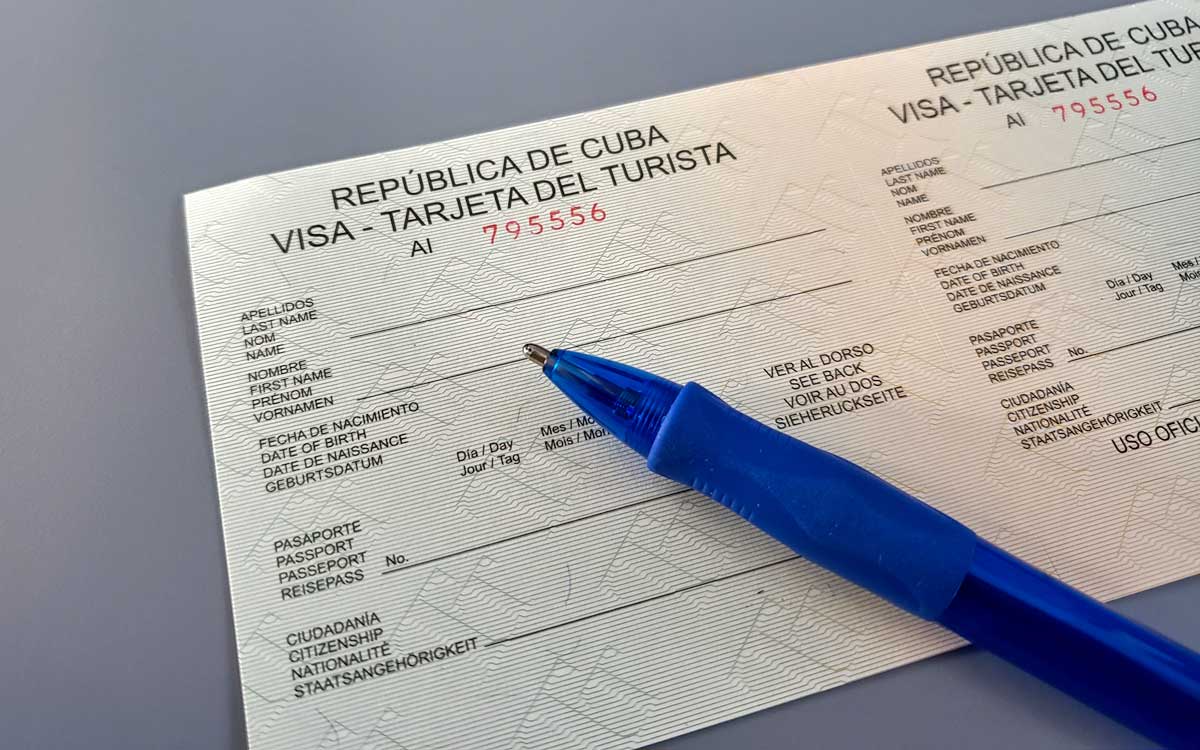
Cuba visa application form
What are the visa and entry requirements to Cuba?
US Citizens
Planning a trip to Cuba as a US citizen? There are special regulations you need to be aware of. While tourism trips to Cuba aren't yet authorized, general licenses have been issued for a variety of travel categories. If you meet the requirements of the general license under which they plan to travel, you won't need to apply for another permit from the OFAC (Office of Foreign Assets Control of the Treasury Department) for your trip.
However, it's important to note that the US Embassy in Havana and the State Department in Washington D.C do not process visa applications for trips to Cuba. If you need to apply for a visa or have any questions regarding your specific case, you should contact the Cuban Embassy in Washington D.C.
And remember, certain activities may not be allowed, so it's best to check with the US embassy for information on organizations or businesses in Cuba that U.S. citizens are not allowed to engage with due to economic sanctions or other legal restrictions.
Canadian Citizens
As a Canadian citizen, you'll need a valid passport for the duration of your stay in Cuba. Make sure your passport's expiration date isn't near to avoid any travel hiccups. Depending on your trip's purpose, you may need different types of visas. If you're traveling as a tourist, you'll need a tourist visa, which can be obtained from tour operators, airlines, or a Cuban government office in Canada.
European Citizens
If you're a European citizen planning to travel to Cuba, remember that visa protocols can vary depending on your country of residence. For most European citizens, a valid passport is required during your stay in Cuba. Some countries, like Spain, require the passport to be valid for at least 6 months.
It's also important to note that if you plan to travel to the United States after visiting Cuba, you'll need a visa. This is because the electronic system for travel authorization (ESTA) is not sufficient for those who have traveled to Cuba before. This visa must be obtained at the Consulate General of the US Embassy in your place of residence.
Given the varying requirements, it's a good idea to contact your tour operator or travel agency to understand the specific visa requirements for your travel.
Latin American Citizens
For Latin American citizens, a valid passport is required during your stay in Cuba. You'll also need to obtain a tourist visa or tourist card for your trip. This can be processed at tourism agencies or airlines, which usually handle its issuance.
The visa is generally issued for about 90 days and can then be extended. It's also important to note that you should have travel insurance with medical coverage.
Visa Costs: What to Expect
Visa costs can vary depending on where it's issued. Generally, prices range between $20 and $80. If you apply online, additional charges may apply, and prices can range from $110 to $150.
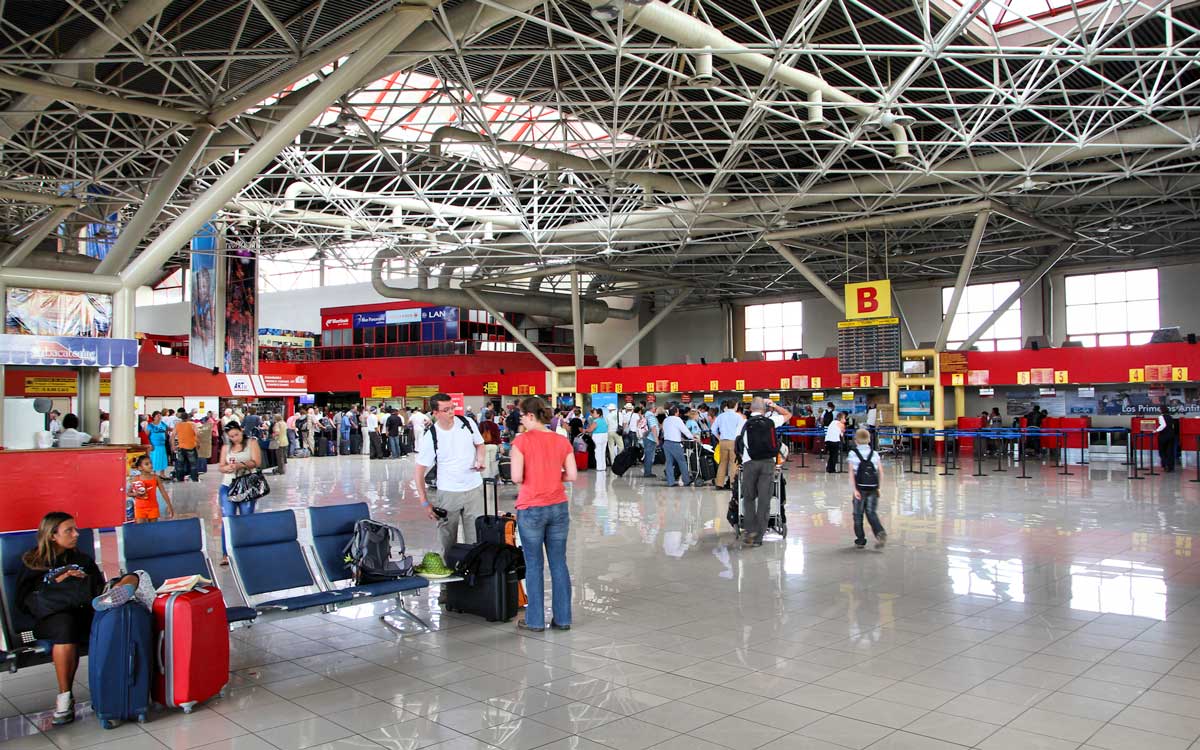
Jose Marti International Airport in Havana
What items can I bring to Cuba?
When packing for your trip to Cuba, you can bring personal effects, including personal phones and computers, free of charge. The range of objects you can bring to Cuba is quite wide, from musical instruments to televisions. However, some items may be subject to charges depending on Customs regulations.
Some items can be brought into the country without having to pay any import taxes. These include used personal objects, art and literature books, music discs, manufactured pharmaceutical products, and wheelchairs, among others.
However, it's crucial to be aware of prohibited items. While some of these, like explosives, drugs and narcotics, and blood derivatives, may seem obvious, others might surprise you. For instance, literature, articles or objects that are considered obscene, pornographic or that attack the general interests of the nation are also prohibited.
If you attempt to bring into the country articles that are not allowed for import, the General Customs of Cuba can exercise administrative sanctions. This means that Customs can seize those imported articles whose entry is prohibited in Cuba, as well as products that have been entered with a fraudulent declaration.
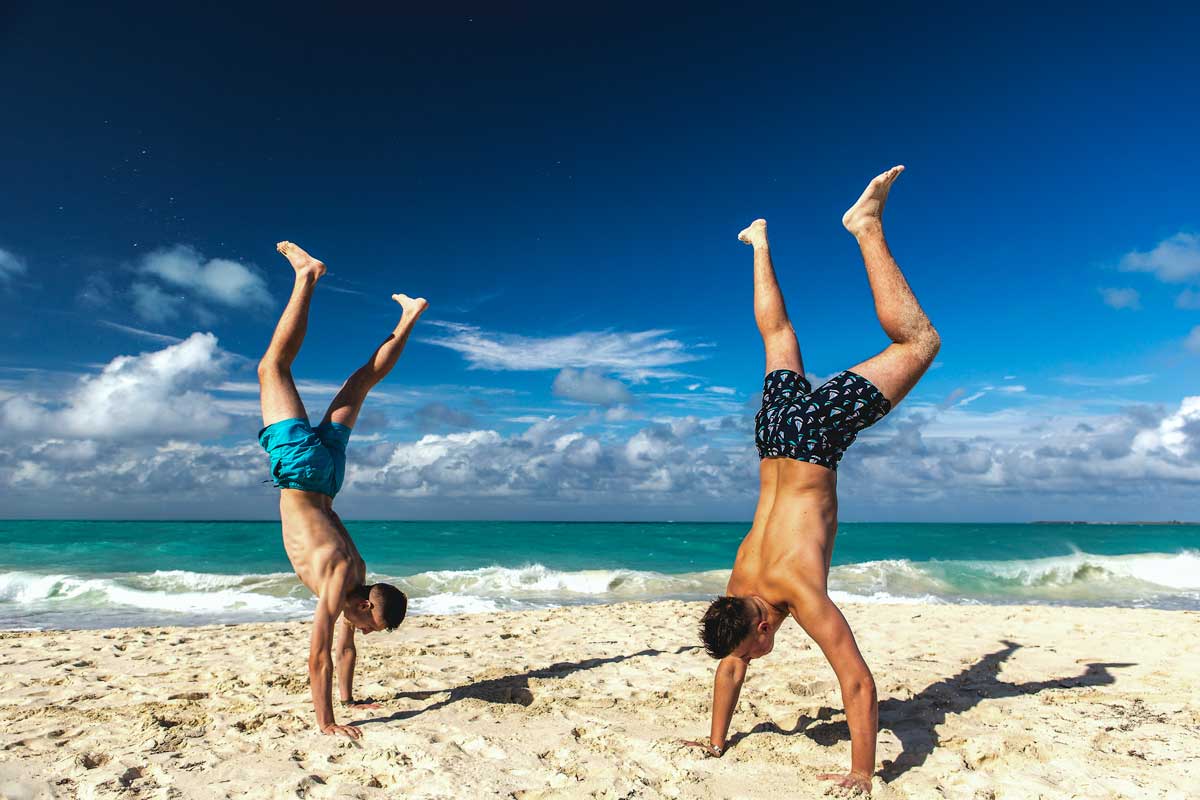
Travelers on a beach in Varadero
Photo: Unsplash
Health and Vaccinations
Before you embark on your journey to Cuba, it's important to ensure you're up to date with routine vaccines. This includes vaccines against chickenpox, tetanus, influenza, rubella, and polio. In the current climate, being vaccinated against COVID-19 is also essential.
Additionally, consider getting vaccinated against Hepatitis A and Hepatitis B. If your trip to Cuba includes exploring nature or venturing into rural areas away from the city center for activities such as outdoor camping, the rabies vaccine is also recommended. Travelers are also advised to consider the typhus vaccine.
Can I bring my pet to Cuba?
If you're planning to bring your pet to Cuba, there are a few requirements you need to meet. Make sure your pet has the necessary vaccines and an official health certificate. You'll also need to request a travel certificate for your pet from the Consulate or Embassy of Cuba in your country.
Written by Teresita Padrón .
Published July 2023.
Explore Top Destinations in Cuba
Five of the most instagrammable cafes in havana.
Havana is full of gems to start your morning on
Explore Varahicacos Reserve in Varadero
Indulge in the landscape of Cuba at Varahicacos Ecological Reserve,
Marabana – Havana’s Annual Marathon
The Marabana, Havana’s annual marathon, is a unique opportunity to
LGBTQ+ Nightlife: Six Gay-Friendly Venues to Visit in Havana
Havana's LGBTQ+ scene is livelier than ever! Check out these
The Cuban Cigar: Everything You’ll need to know
Learn about the curious and mysterious history of the Cuban
Visit Chinatown in Havana
Visit the only Chinatown in Cuba, right in Central Havana,
Five Cuban Clothing Brands to Shop for in Havana
Take a look at the emerging Cuban dress wear brands
Lesser Known Parts of Cuba to Discover This Year
Escape the crowds and Look further into the Cuban landscape
Havana’s National Museum of Fine Arts
Your essential guide to one of Cuba’s most fascinating cultural
Top Four Jazz Clubs in Havana
Things to DoTop Four Jazz Clubs in Havana La Zorra
Subscribe to our newsletter
Get more travel inspiration, tips and exclusive offers sent straight to your inbox
I would like to get Visit Cuba newsletters in my inbox
Paradise for Your Inbox

- Online Check-in
- Destinations
- Cuba travel preparation
DISCOVER CUBA YOUR WAY – TIPS FOR PREPARING FOR THE ROAD TRIP
The travel has been booked. The countdown in running and the can’t-wait-feeling grows. So you can really enjoy your road trip to the full, it is important to prepare well, and this includes planning an itinerary. The Caribbean island of Cuba offers authentic culture, breath-taking landscapes and on every corner you meet warm and open people with a love of life who can hardly wait to give you their take on the history of Cuba. By going on a road trip through Cuba you can customise the journey to your personal wishes and discover Cuba your way. Nevertheless, you should bear the following in mind:
Important questions before the trip – a checklist:
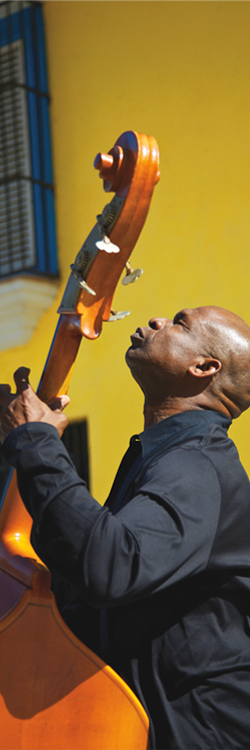
- Is your passport valid for at least 6 months?
- Have you got a valid proof of your international travel health insurance? This must be in Spanish, as otherwise you may not be allowed to enter Cuba.
- How many persons will be accompanying you, and how much luggage will you all be taking? Depending on the size of your group and the planned route, you may be best advised to look for and book the right vehicle category well in advance. Interest in travelling in Cuba has grown fast over recent years and is likely to continue to grow. The demand for hire cars is increasing greatly but the capacity is not. So make sure you have booked the kind and size of car you need well ahead to avoid disappointment.
- Do you possess a valid VISA credit card ? You need a VISA card or MasterCard to be able to withdraw cash. Most cashpoints only accept VISA cards. American credit cards do not work.
- Have you got a Cuban Tourist Card (Tarjeta del Turista)? You need one to enter the country.
- Have you got two copies and printouts of all travel components and services (like flight, hotel voucher, car rental voucher, etc.)? It is advisable to carry at least 1 or 2 printout copies of all booked services and components. Digital confirmations are not always accepted.
- If don’t speak Spanish, do you have a Spanish dictionary ? It is advisable to learn some elementary Spanish and take a pocket dictionary or suitable Spanish language app to get the most out your Cuban road trip.
- Have you got a good map app installed on your smartphone? If you book with TUI CARS you are always entitled to use City-Maps-2-Go free. Make sure you have downloaded offline maps of Cuba in advance. City-Maps-2-Go also offers a good guide to Cuban sights.
TIPS FOR DRIVING IN CUBA – THINGS YOU NEED TO KNOW
Spontaneous, flexible and adventurous. This is the way to experience Cuba, the country of contrasts, in a hire car. But what do you have to consider if you want to enjoy driving on bustling roads in the company of so many classic cars?
Think about the kind of car you want to hire in good time: book your Cuba trip and you’re off
To make sure you can drive the category of car of your choice you should book your hire car on line a few months in advance. Demand is huge, particularly for certain higher-range vehicle categories (e.g. mid-size, passenger van or SUV). Please note that the TUI CARS’ service package on Cuba differs from the standard all-inclusive package. The following services are included for all hire cars:
- Additional liability insurance cover of 7.5 million euros
- Local taxes
- Unlimited mileage
- Smartphone map app
Hiring a car on Cuba – what costs are payable at the local rental office?
Please remember that additional fees will apply when picking up the car: Our local partner in Cuba VIA Rent-a-Car charges for a super Collision Damage Waiver: this is paid at the rental office by credit card. See the rental conditions for details. Any other add-on services or extras (like one-way rental or additional driver) must also be paid at the rental office by credit card.
Tips for hiring a car
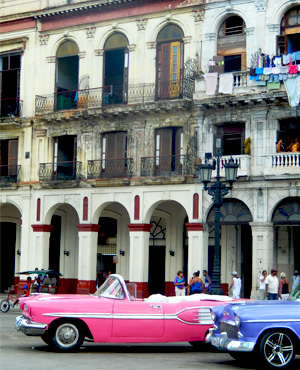
A frequently asked question before the trip is: What kind of driving licence do you need to drive a hire car in Cuba?
Basically, we recommend you possess an International Driving Permit. Often the rental conditions do not specifically point this out – but it is better to play it safe. You should also be aware that the minimum age for hiring a car is 19 – this applies to all categories except Group E (e.g. Mini van). Please make sure you take the following documents with you:
- Driving licence (original)
- Passport (original)
- VISA card or MasterCard for the deposit and extra insurance
- Rental car voucher (to be safe take two copies)
In addition, factor in some extra time and patience for doing the paperwork, as time is a different concept on Cuba. Indeed, it is good idea to borrow some Cuban serenity to enjoy your road trip to the full …. remember: you are in Cuba. But not before you have given the car some careful scrutiny: make sure any scratches or defects are documented on the pre-rental vehicle condition report sheet and that you have a copy, and check that the seat belts and brakes work, and that the car has a spare wheel. IMPORTANT: keep a copy of the rental agreement. Ready for the road trip: driving in Cuba In a hire car you can put together an itinerary that suits you and see the things you want to see. Nevertheless, you should bear the following in mind:
Ready for the road trip: driving in Cuba
In a hire car you can put together an itinerary that suits you and see the things you want to see. Nevertheless, you should bear the following in mind:
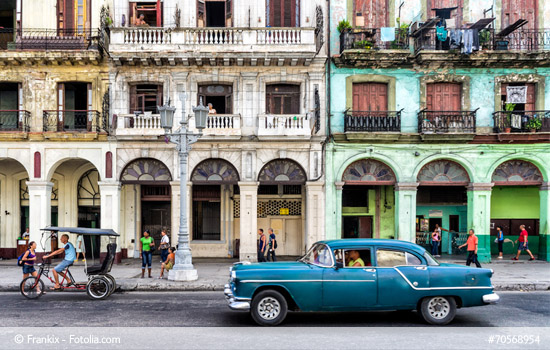
Factor in sufficient time for the route
To avoid stress and driving against the clock make sure you factor in enough time for the route you want to drive. Road conditions on Cuba vary a lot, and there are many speed restrictions. For instance, the speed limit on motorways is 100 km/h . Although motorways are in better condition than country roads, you still have to watch out for potholes. Also, a motorway on Cuba is not like a motorway in Europe. On Cuban Autopistas you can often encounter pedestrians, carts and wagons, and cyclists. The maximum speed allowed on country roads is 80 km/h and in towns it is 50 km/h . Whatever you do, make sure you comply with the prescribed speed limits. Police speed checks are frequent. As a rule err on the side of caution and do not drive too fast, as road conditions outside larger towns are not optimal. In town centres the streets are in good condition. Even when planning shorter routes factor in sufficient time so you can enjoy the trip without driving against the clock.
Keep an eye on the fuel gauge
As tourists cannot use all petrol stations on Cuba, you should keep an eye on the fuel level indicator. It is also possible to reach a service station and find that it is out of fuel. So bear this in mind when planning routes and reckoning distances. Tourists are only allowed to fill up at the state-owned Servi-Cupet stations, where you pay with the tourist currency CUC. These stations also have Especial petrol pumps. These are clearly marked.
Highway code on Cuba
Don’t worry – the highway code is very similar to the one you are used to, as it is based on international traffic conventions. Remember, Cubans tend not to use indicators, but prefer to stick their left arm out of the window to indicate they are turning left.
Typical Cuba: Amarillos – getting to know the country and people
You will undoubtedly often spot puntos Amarillos on the side of the road. These are places where yellow-uniformed administrators (los Amarillos) of the official Cuban hitchhiking system organise rides for locals with passing vehicles. Mostly tourist hire cars are not stopped to take passengers on board. If you speak Spanish and want to know get to know locals and gain real insider tips, you are free to offer to take passengers at the puntos amarillos.
Don’t drive…
…. at night or during strong rain storms. Many Cuban cars and trucks don’t have proper lights. Moreover, animals roam the roads at night.
Back to Magazine
Cookies on GOV.UK
We use some essential cookies to make this website work.
We’d like to set additional cookies to understand how you use GOV.UK, remember your settings and improve government services.
We also use cookies set by other sites to help us deliver content from their services.
You have accepted additional cookies. You can change your cookie settings at any time.
You have rejected additional cookies. You can change your cookie settings at any time.
- Passports, travel and living abroad
- Travel abroad
- Foreign travel advice
Before you travel check that:
- your destination can provide the healthcare you may need
- you have appropriate travel insurance for local treatment or unexpected medical evacuation
This is particularly important if you have a health condition or are pregnant.
Emergency medical number
Call 104 and ask for an ambulance.
Contact your insurance company promptly if you’re referred to a medical facility for treatment.
Vaccine recommendations and health risks
At least 8 weeks before your trip:
- check the latest vaccine recommendations for Cuba
- see where to get vaccines and whether you have to pay on the NHS travel vaccinations page
Go to TravelHealthPro to see what health risks you’ll face in Cuba, including:
To control the spread of mosquito-borne diseases, the Cuban authorities may carry out chemical fumigation measures across the island. The chemicals used may cause some discomfort if you come into contact with them.
There are severe shortages of basic medicines, but clinics treating foreigners are more likely to stock basic medical supplies. Many medicines, pharmacy items and sanitary products that are easily accessible in the UK, are not available in Cuba.
If you have a pre-existing medical condition, do not expect to buy medication in Cuba. A letter from your GP stating treatment and dosage may be helpful if you need treatment from a medical practitioner.
The legal status and regulation of some medicines prescribed or bought in the UK can be different in other countries. Read best practice when travelling with medicines on TravelHealthPro .
The NHS has information on whether you can take your medicine abroad .
Healthcare facilities in Cuba
Medical facilities in Havana are better than elsewhere in Cuba. If you need medical treatment, you or your insurance company will need to pay by card with foreign currency before any treatment. Make sure you have accessible funds to cover the cost of any medical treatment abroad and repatriation.
FCDO has a list of English-speaking doctors in Cuba .
Travel and mental health
Psychiatric care facilities for foreigners are limited and difficult to access.
FCDO guidance on travel and mental health . There is also mental health guidance on TravelHealthPro .
Related content
Is this page useful.
- Yes this page is useful
- No this page is not useful
Help us improve GOV.UK
Don’t include personal or financial information like your National Insurance number or credit card details.
To help us improve GOV.UK, we’d like to know more about your visit today. We’ll send you a link to a feedback form. It will take only 2 minutes to fill in. Don’t worry we won’t send you spam or share your email address with anyone.

Welcome to Cuba
Embark on a journey to soulful horizons, unveiling the hidden jewel of the caribbean.
Get ready to embark on an extraordinary journey through the wonders of Cuba, where history, culture, and natural beauty intertwine. From the enchanting streets of Old Havana to the breathtaking landscapes of Viñales Valley, this captivating island offers a myriad of experiences that will leave you in awe. Explore the colonial charm of Trinidad, relax on the pristine shores of Varadero, and immerse yourself in the rhythms of Santiago de Cuba. Discover the vibrant colors, rich heritage, and warm hospitality that make Cuba a truly unique destination. Whether you’re wandering through cobblestone alleys or diving into the turquoise waters, each experience in Cuba will unveil a new layer of its captivating soul. Get ready to embrace the best that Cuba has to offer and create memories that will last a lifetime.
Experience Cuba's magic
Incredible cities, stunning beaches, amazing landscapes, travel essentials.

Travel guide

Visa & Requirements

Travel tips
Visit la havana, relax on varadero beach, discover trinidad, dive into cienfuegos, experience the rhythms of santiago de cuba, #cubatravel share your story.

Tourist Card Travel Authorization
Maximum visit: 30 days
Multiple entries: no
Processing time:
- EU: 2 business days
- Rest of the world: 4 business days
Requirements:
No Covid-19 vaccination certificate or negative PCR test result is required anymore
All travellers are required to complete a Health Declaration (Declaracíon Jurada de Sanidad) online before travel to be submitted to the Health authorities on arrival at the port of entry.
Eligible are ALL nationality except the following:
Visa exemptions:
Embassy visa required:

Tips before going
TravelCuba.org is a comprehensive tourism portal and advisor for Cuba, designed to provide travelers with all the information they need to plan a perfect trip to the country. The website offers a wealth of information on Cuban culture, history, attractions, and activities, as well as practical tips on visa requirements, transportation, and accommodations. TravelCuba.org is dedicated to promoting tourism in Cuba and showcasing the best the country has to offer. With expert advice and insider tips, TravelCuba.org is the ultimate guide for anyone planning to visit Cuba.
Disclaimer: TravelCuba.org is an independent travel advisor and is not affiliated with or endorsed by any government agency or organization. We provide travel assistance services to individuals who are planning to travel to Cuba. Our services are designed to help travelers navigate the complex travel requirements and procedures, and our team of experienced professionals provides personalized support to ensure that travelers have a seamless and hassle-free travel experience. Please note that TravelCuba.org is not a substitute for official government resources or processes, and we strongly advise travelers to refer to the relevant government websites and resources for the most up-to-date and accurate information.

Entry regulations
Find all entry regulations for flights to Cuba in the following table*.
When entering Cuba, an online declaration of health status must be filled out in advance; however, submitting the form is only possible 48 hours before travel at the earliest . Proof of health insurance covering the cost of COVID-19 treatment must be presented.
Prior to Travel
There are no known restrictions
Visas and tourist cards can be applied for at the Cuban diplomatic mission abroad.
Travellers may extend their stay via the immigration authorities once by 90 days.
Travellers should ensure they do not exceed the permitted length of stay in the destination country in order to avoid possible sanctions such as fines, custody pending deportation or even entry bans.
The Federal Foreign Office points out that in view of the worldwide COVID-19 pandemic, there are still risks associated with international travel, especially for people without full vaccination protection as well as vulnerable groups. Regulations on entry or international transport connections can change quickly with the pandemic situation.
The so called "3G rule" is lifted when entering Germany, there is a recommendation to wear a mask at some airports.
Prior to Entry
There are no COVID-19-related entry restrictions (e.g. border closures, mandatory proof of testing and vaccination) in force at this time.
When entering Cuba, an online declaration of health status must be filled out in advance; however, submitting the form is only possible 48 hours before travel at the earliest. Proof of health insurance covering the cost of COVID-19 treatment must be presented.
The Cuban authorities continuously adjust the entry regulations, which may change at short notice.
Transit is permitted without COVID-19 related restrictions.
Children and minors are not generally exempt in case testing requirements apply.
Random tests can be carried out at the airport.
Should travellers show signs of symptoms upon arrival, they may be transferred to a health facility where they undergo a PCR-test.
No notes available.
There is no testing or quarantine requirement on entry for completely immunized persons.
There is no testing or quarantine requirement on entry for incompletely vaccinated persons.
There is no testing or quarantine requirement on entry for those who have recovered.
There is no ease of restrictions.
COVID-19 related documentary proof of vaccination, recovery, or a negative test result is not currently required.
Current value: 1. Previous week: 1 Data source: Our World in Data / European Center for Disease Control. The data is only available at country level and is updated daily.
There are currently no COVID-19-related travel restrictions in the country.
There are currently no more COVID-19-related restrictions.
Shops and businesses are open.
Restaurants and bars are open.
Events may resume.
Public transport between provinces may still be restricted. Face masks are mandatory in public transport.
If travellers test positive for COVID-19 during their stay, they may be required to go into a quarantine hotel. Internet access is not guaranteed in these facilities. If travellers stay in private accommodation, they may get regular visits by medical representatives.
Entry/return to Germany
For travellers entering from a risk-free area, there are no longer any registration or other requirements.
There is no obligation to test before entering Germany.
Since May 2022, no proof of a negative test, a vaccination or recovery is required, in order to enter Germany.
Further information on the new entry regulation can be found at the Federal Government 's website.
There is no obligation to test after entering Germany.
[QRRISKOFREI]
There is no testing or quarantine requirement for completely immunized persons on entry/return.
Vaccinated persons are exempt from national quarantine and testing obligations. (Caution: In Germany, only the vaccines by BioNTech/Pfizer, Moderna, AstraZeneca, Johnson & Johnson, and Novavax have been approved so far.) Further information is available from the Federal Government .
According to the Robert Koch-Institute, it is a risk-free area . There is no quarantine obligation after entry into or return to Germany.
There is no testing or quarantine requirement on entry/return for incompletely vaccinated persons.
There is no testing or quarantine requirement on entry/return for those who have recovered.
Recovered persons are exempt from quarantine and testing obligations nationwide, area of active circulation of highly contagious virus variants . Those who have recovered need proof of a positive PCR test (or other nucleic acid detection) at least 28 days and no more than 3 months ago. Recovered persons must not have any symptoms of a possible COVID-19 infection. Further information is available from the Federal Government .
*All information is without guarantee and is based exclusively on information provided by external sources, e.g. the German Foreign Office. We do not guarantee the accuracy, completeness and timeliness of this information. Please inform yourself about the applicable entry requirements before your flight.

IMAGES
VIDEO
COMMENTS
Read our travel advice and tips for Cuba. Get the latest guide & essential information before going to Cuba. Discover your smile with TUI%2C the world%27s biggest travel group%2E We offer you even more handpicked holiday choices%2C city breaks%2C short breaks%2C cruises %26 more%2E.
1. Double-check your insurance. You are required to have medical insurance to visit Cuba and will need to bring digital or printed proof of your policy. Random checks are made at the airport. If you arrive without insurance, you'll be asked to buy a Cuban policy at the airport for US$30. 2.
Living in Cuba. Travelling to Cuba. FCDO travel advice for Cuba. Includes safety and security, insurance, entry requirements and legal differences.
To enter Cuba, your passport must have an 'expiry date' at least 6 months after the date you arrive and 3 months after your planned departure date. Check with your travel provider that your ...
What Americans need to know about traveling to Cuba. Making sense of the new travel policies and rules. This year, Cuba ranked as the top trending destination in the 2023 Travelers' Choice awards, meaning Cuba-focused pages on Tripadvisor are seeing an increase in year-over-year activity. But having swung back and forth throughout the last ...
"Cuba has overcome the pandemic thanks to a 'prevention and control' plan, prepared in January 2020," Roy Perez in Santiago de Cuba explained to me when I contacted him by email for some pre-trip advice. "The plan included training medical staff, preparing quarantine facilities, implementing special contact-tracing processes, and informing the ...
FCDO has guidance on staying safe and what to do if you need help or support abroad, including: finding English-speaking lawyers, funeral directors and translators and interpreters in Cuba ...
Best time to go. Cuba is a great destination year round, but is insufferably hot in July and August (though the city of Santiago de Cuba hosts two riotous, musical festivals in July that are worth ...
Greatest Waterfalls in Cuba. Imagine finding yourself in Cuba, surrounded by an exuberant natural environment - where the vivacious green mountains stretch out into a splendid blue sky - while the fresh Caribbean seabreeze brightens your face. And on this tropical voyage, you discover a land of waterfalls on every corner of the island.
Cuba travel advice. Check the latest travel advice on visiting Cuba from official government sources (in english) from around the world including entry requirements and travel restrictions. Learn more about the current safety and security risks from terrorism, natural disasters and more.
Call us in Washington, D.C. at 1-888-407-4747 (toll-free in the United States and Canada) or 1-202-501-4444 (from all other countries) from 8:00 a.m. to 8:00 p.m., Eastern Standard Time, Monday through Friday (except U.S. federal holidays). See the State Department's travel website for the Worldwide Caution and Travel Advisories.
For most European citizens, a valid passport is required during your stay in Cuba. Some countries, like Spain, require the passport to be valid for at least 6 months. It's also important to note that if you plan to travel to the United States after visiting Cuba, you'll need a visa. This is because the electronic system for travel authorization ...
The Foreign & Commonwealth Office and National Travel Health Network and Centre have up-to-date advice on staying safe and healthy abroad. For the latest travel advice from the Foreign & Commonwealth Office including security and local laws, plus passport and visa information check travelaware.campaign.gov.uk/ and follow @FCDOtravelGovUK and ...
Cuba travel preparation. DISCOVER CUBA YOUR WAY - TIPS FOR PREPARING FOR THE ROAD TRIP. ... passenger van or SUV). Please note that the TUI CARS' service package on Cuba differs from the standard all-inclusive package. The following services are included for all hire cars: Additional liability insurance cover of 7.5 million euros;
FCDO travel advice for Cuba. Includes safety and security, insurance, entry requirements and legal differences.
A valid passport is required for travel to Cuba, and Irish passports should have a minimum validity of 6 months. Passport cards cannot be used. Please note that travelling to Cuba will impact on travel and entry to the United States - please see 'US Travel' section below. The arrival form on the D'Viajeros traveller information portal ...
Read our travel advice and tips for Havana. Get the latest guide & essential information before going to Havana. Discover your smile with TUI%2C the world%27s biggest travel group%2E We offer you even more handpicked holiday choices%2C city breaks%2C short breaks%2C cruises %26 more%2E
Cuba Travel; Useful tips; Disclaimer: TravelCuba.org is an independent travel advisor and is not affiliated with or endorsed by any government agency or organization. We provide travel assistance services to individuals who are planning to travel to Cuba. Our services are designed to help travelers navigate the complex travel requirements and ...
Plus, you can make the most of handy tools, like the before-you-go checklist. 2. Follow the Travel Aware social channels and sign up for email alerts for the latest updates. We know things can change after you book, which is why it's important to make sure you're up to speed with the latest travel advice. Travel Aware makes it really easy, too.
Cuba. Find all entry regulations for flights to Cuba in the following table*. When entering Cuba, an online declaration of health status must be filled out in advance; however, submitting the form is only possible 48 hours before travel at the earliest. Proof of health insurance covering the cost of COVID-19 treatment must be presented.